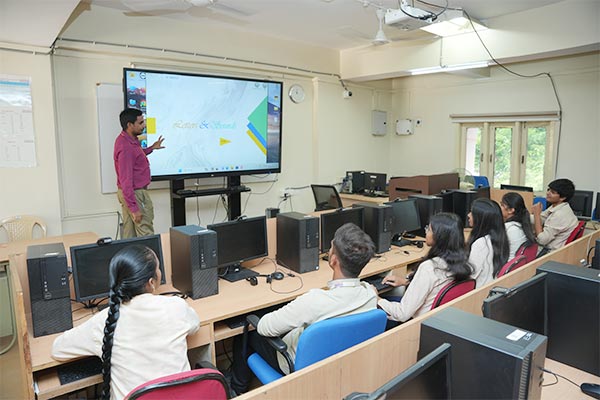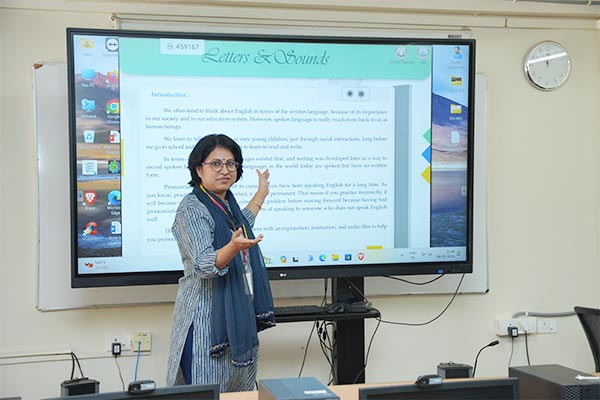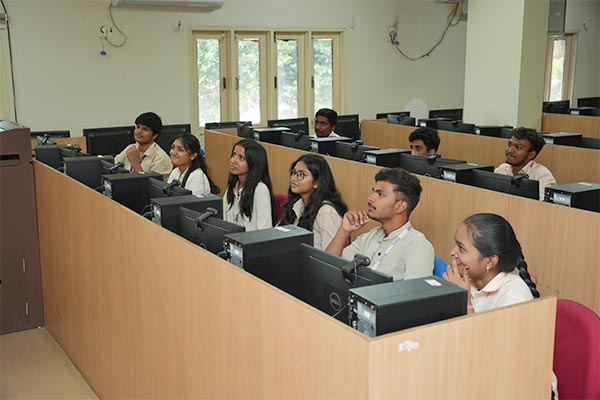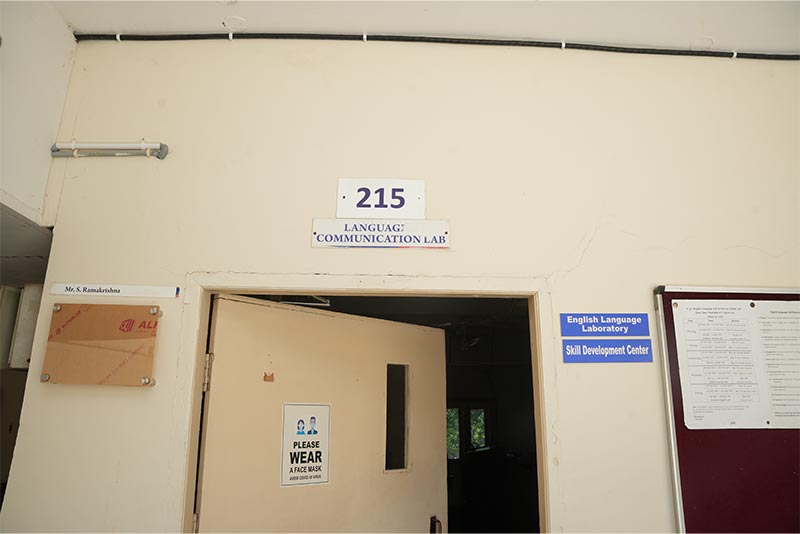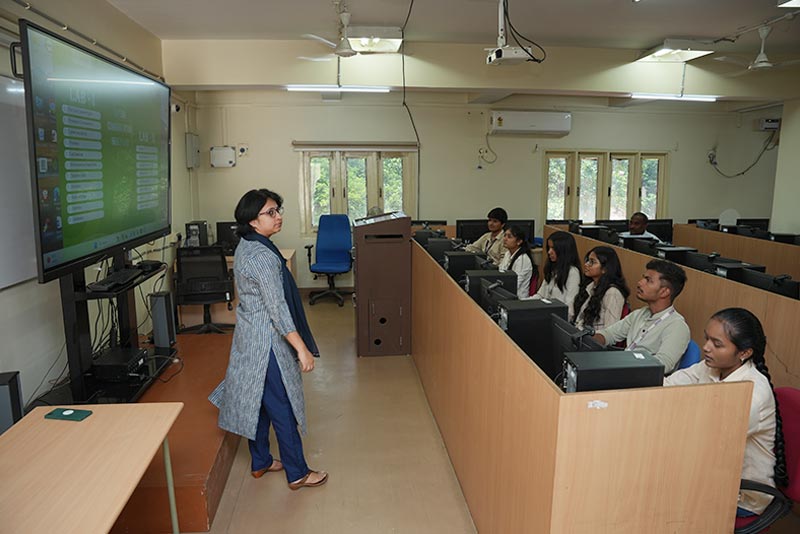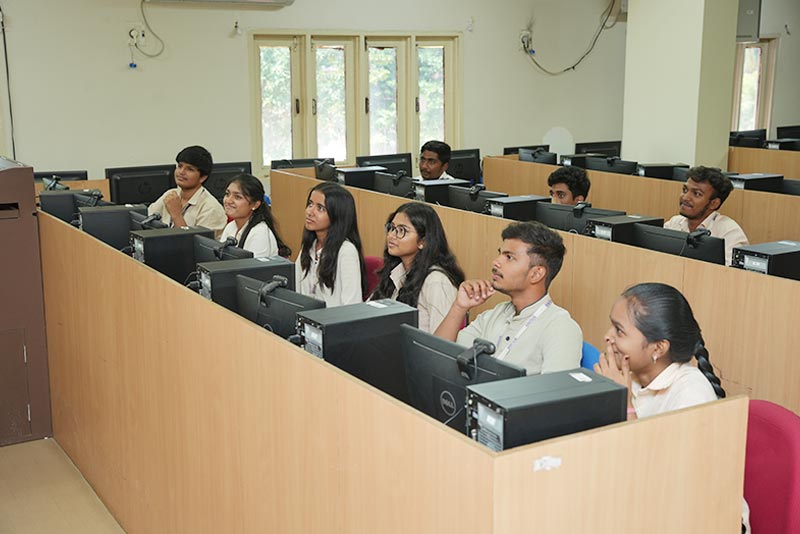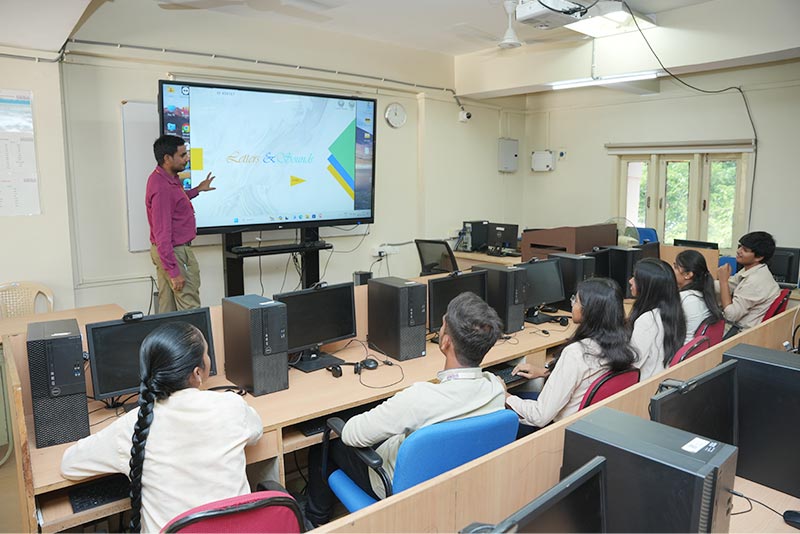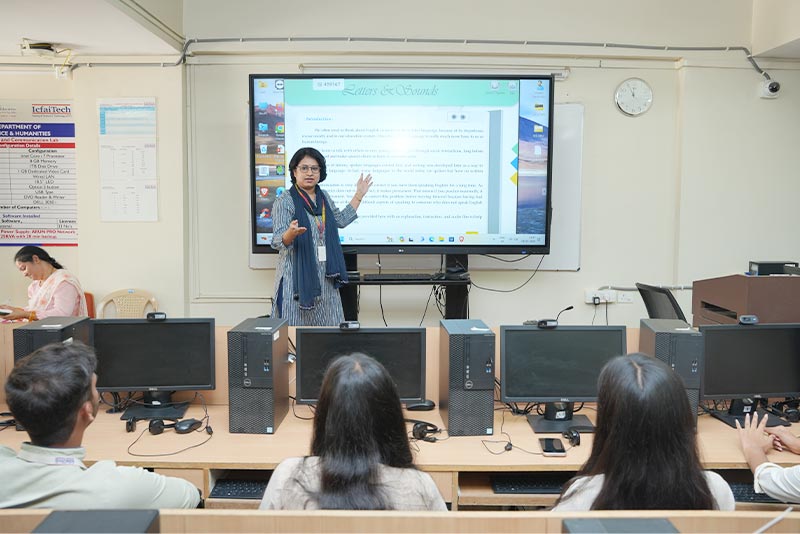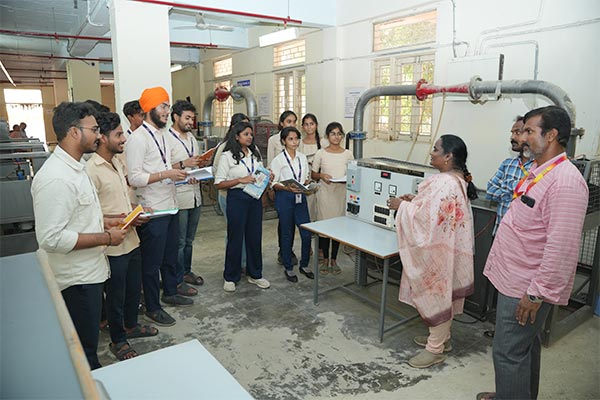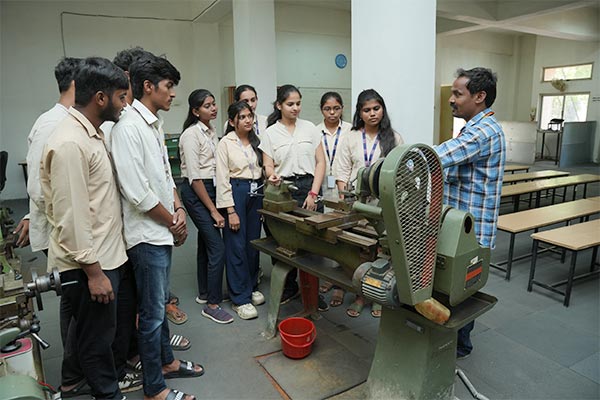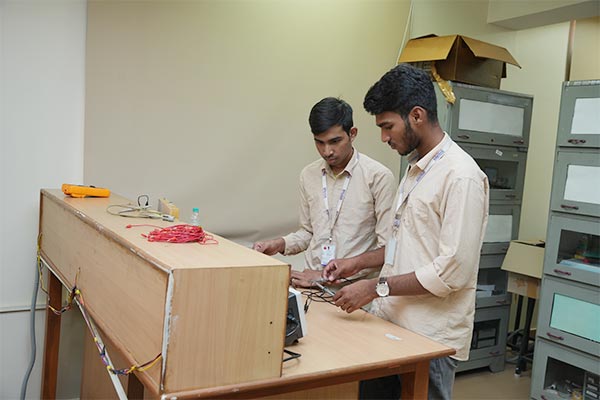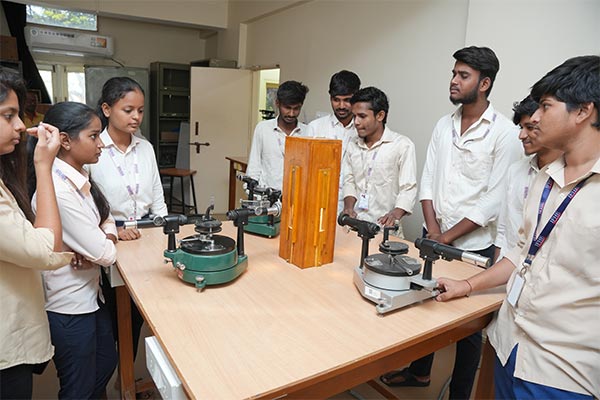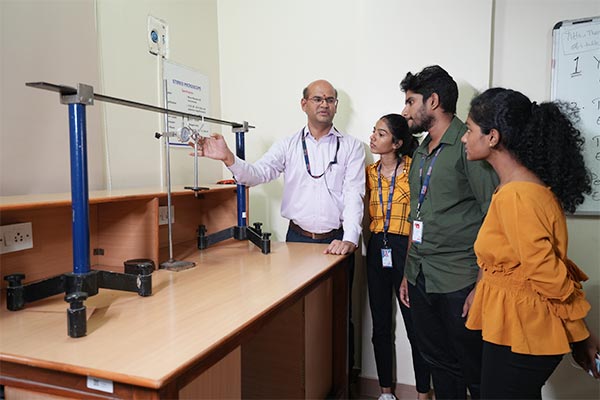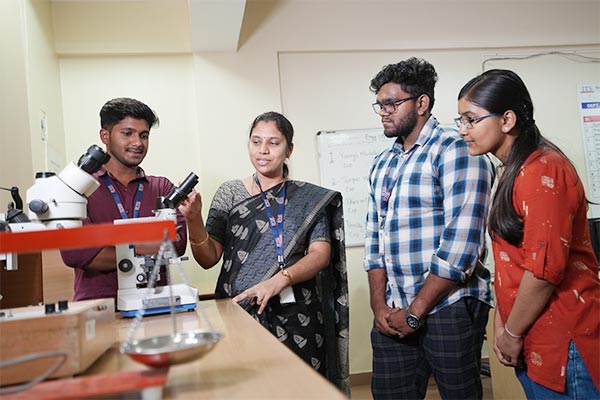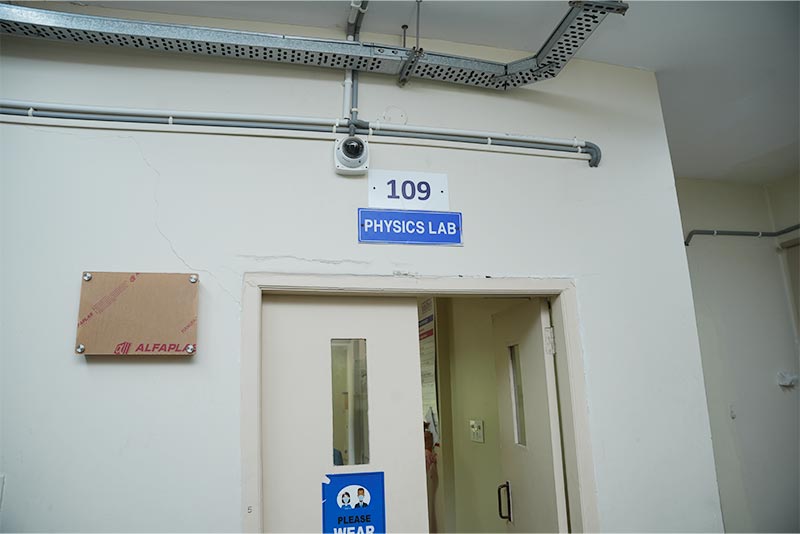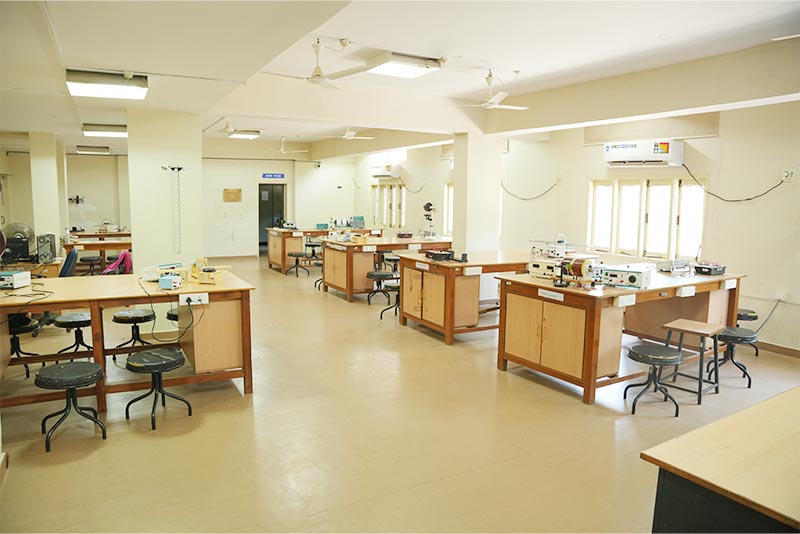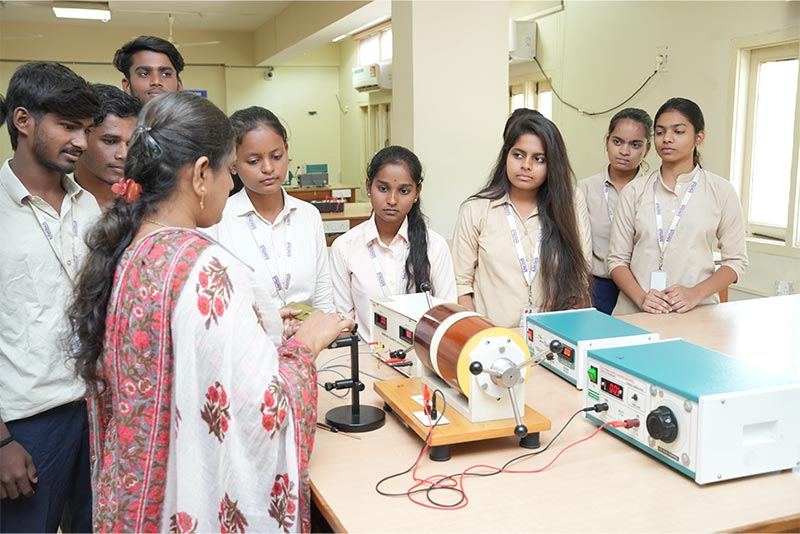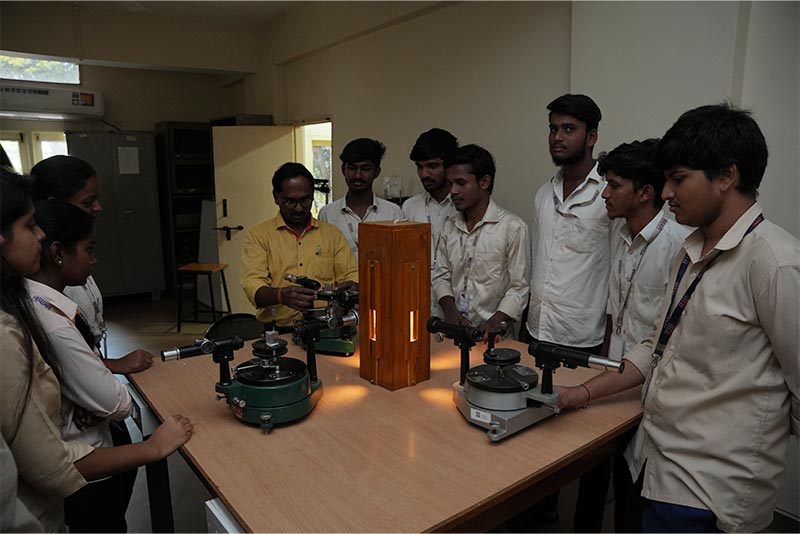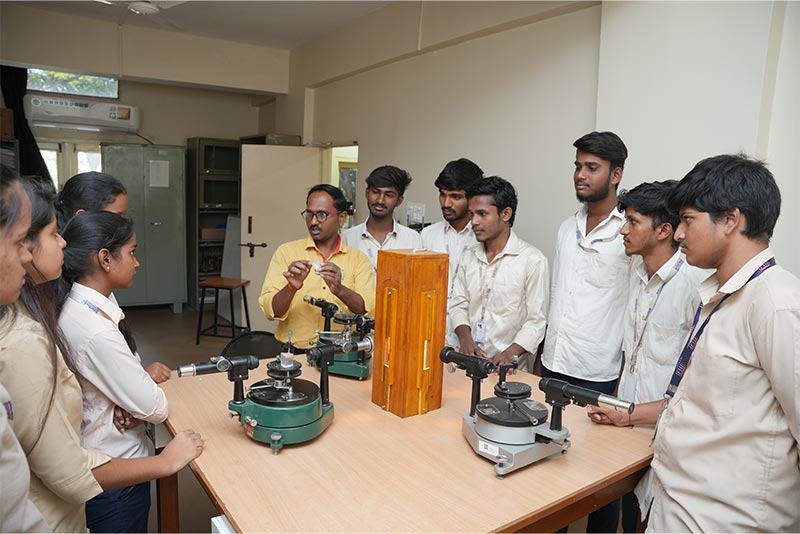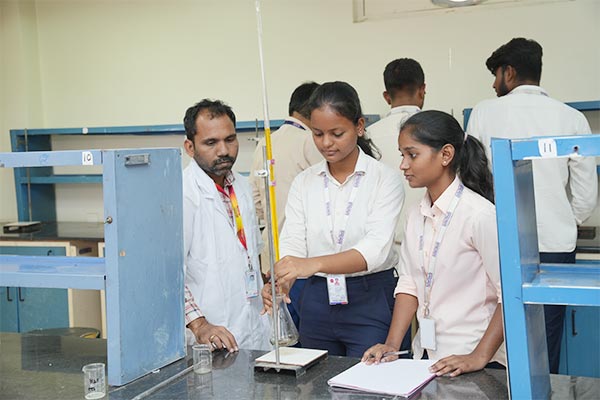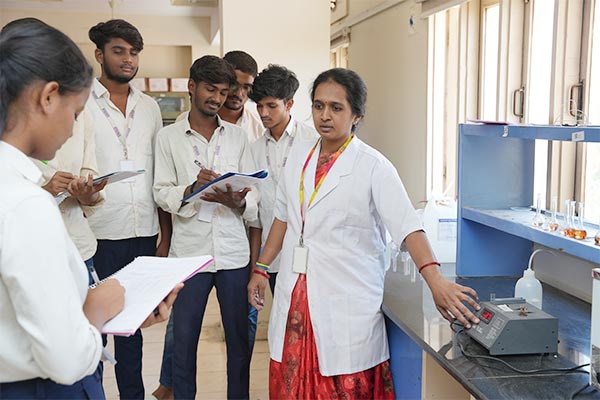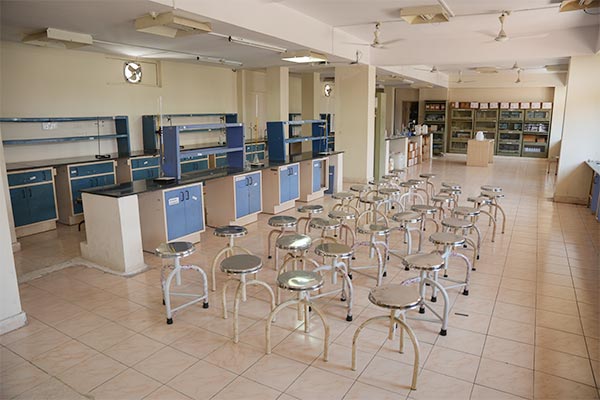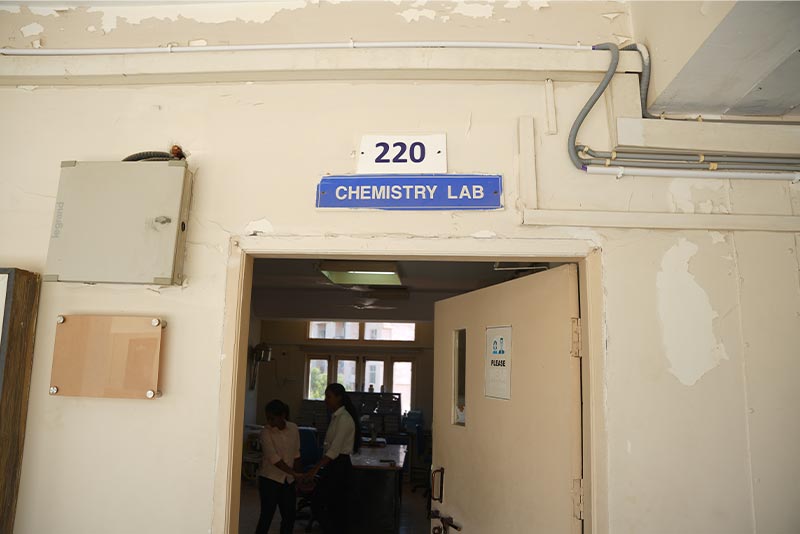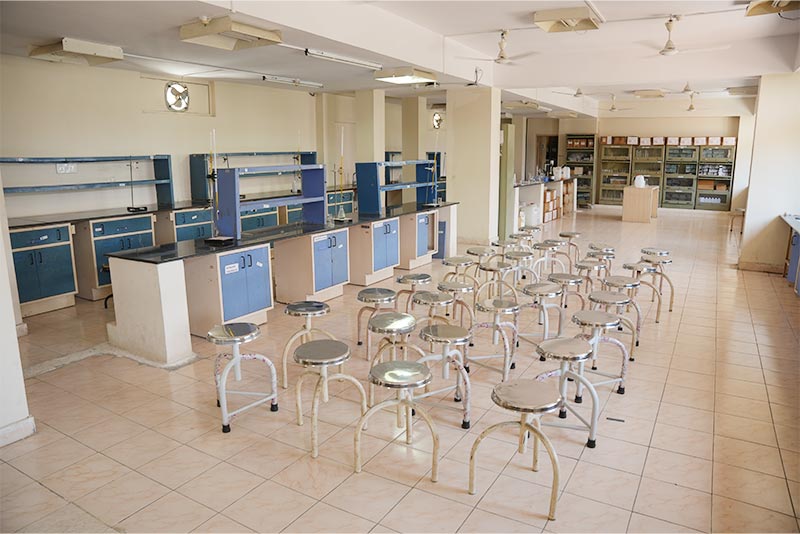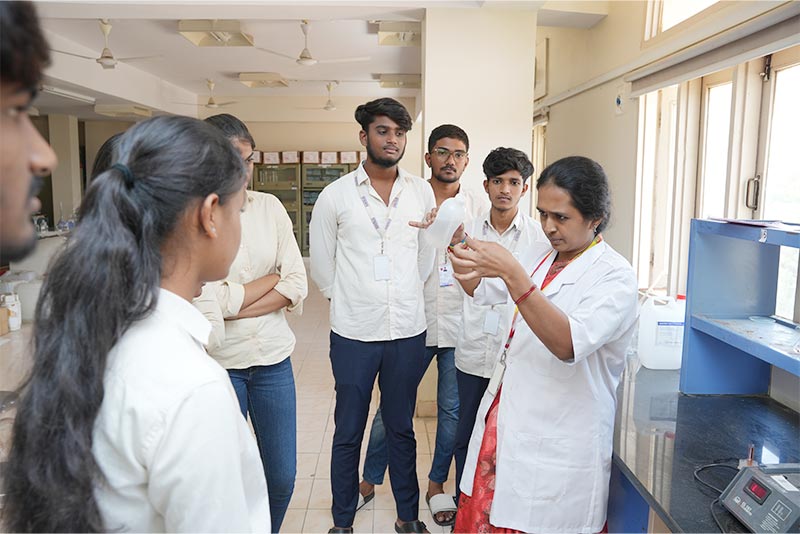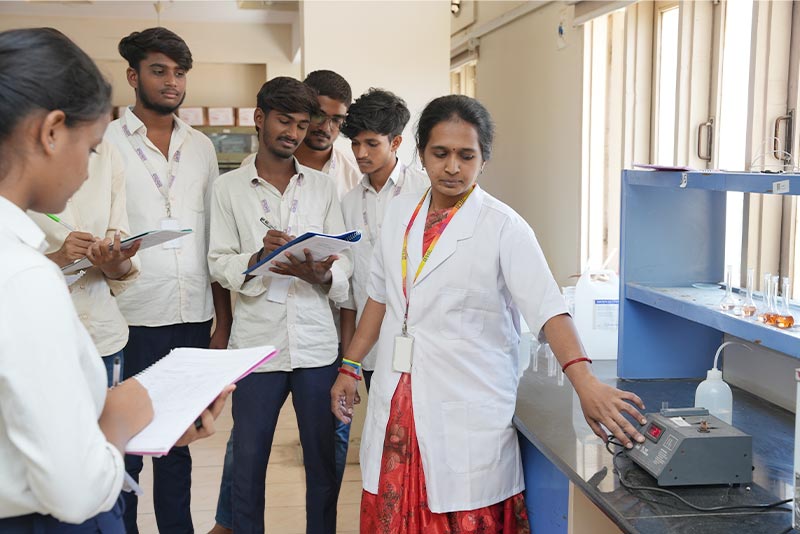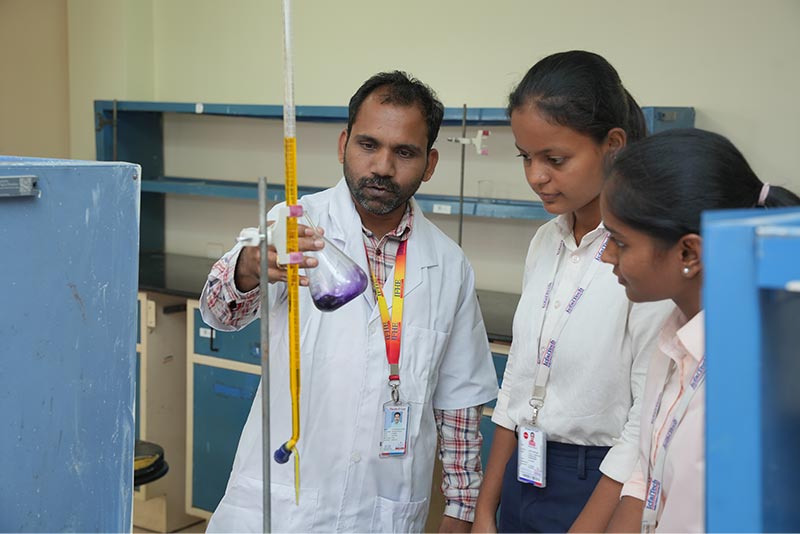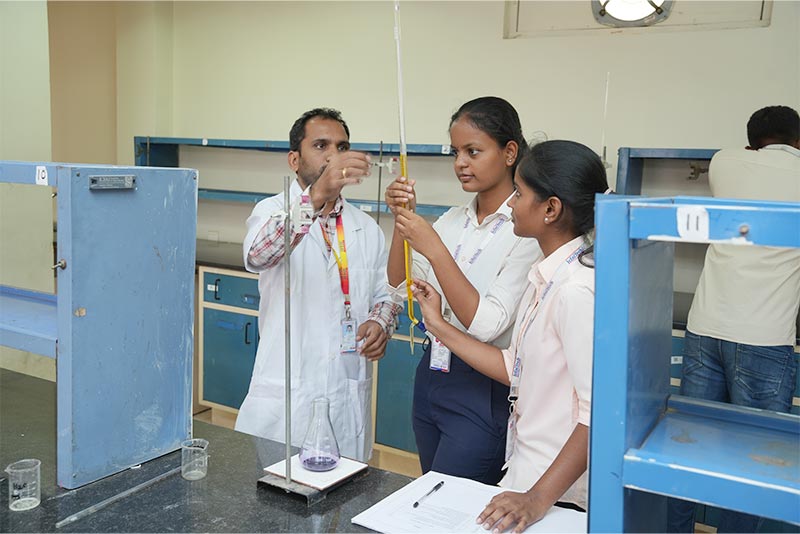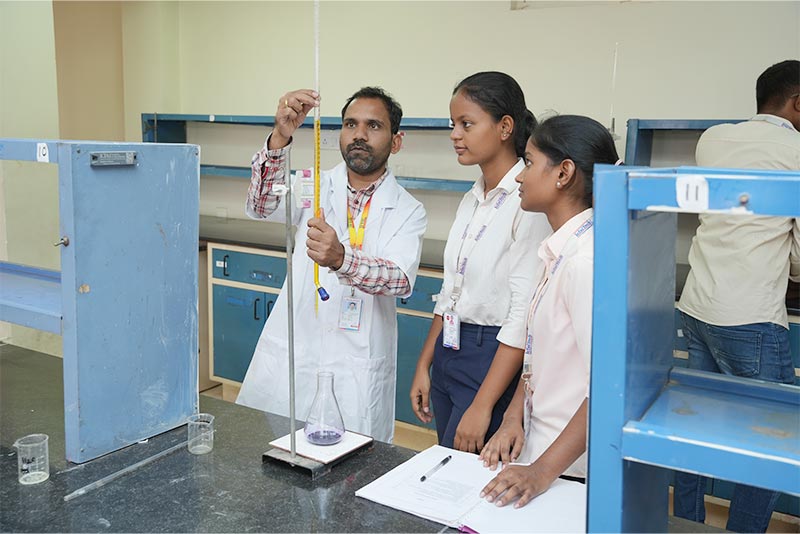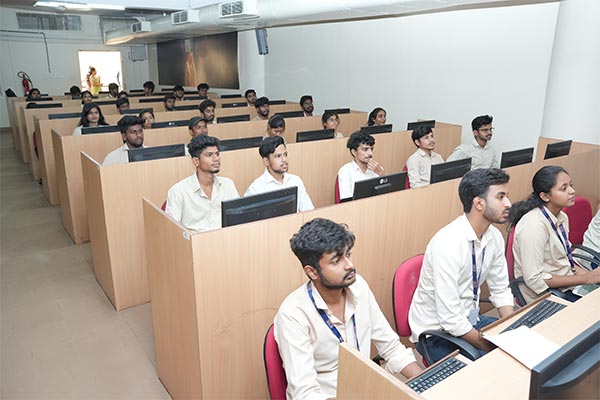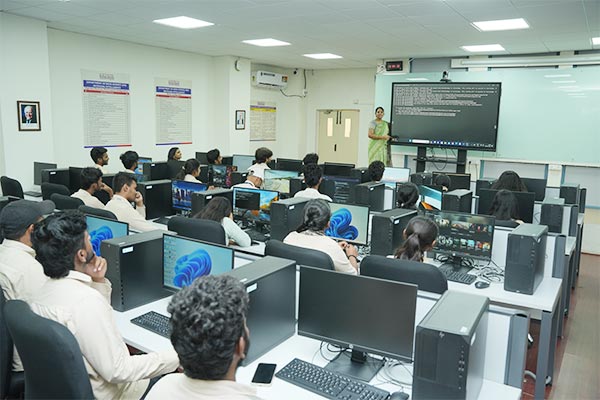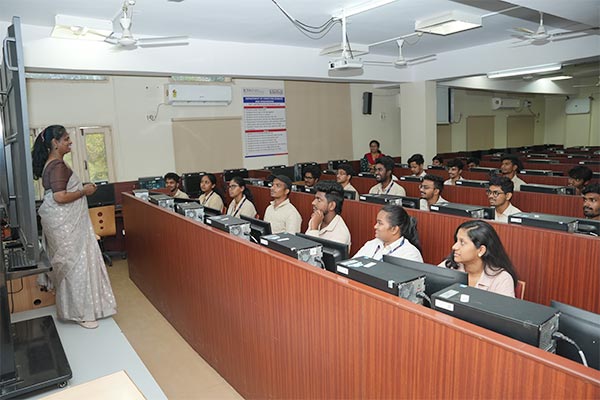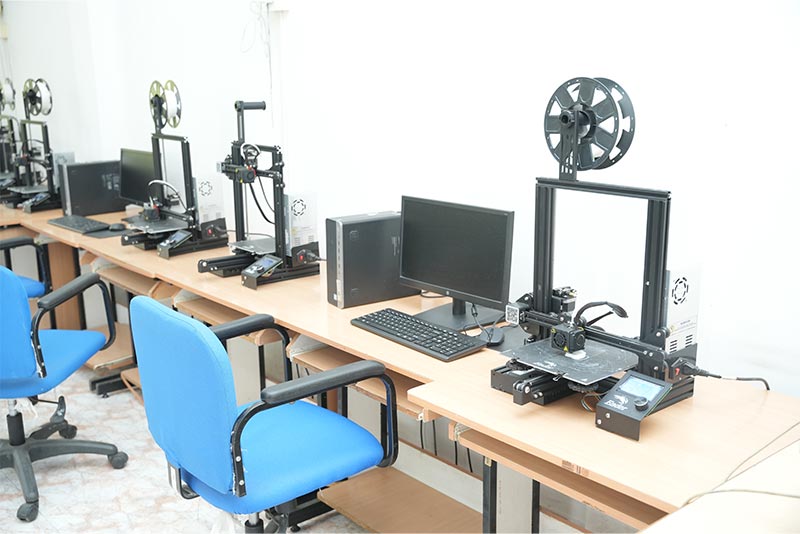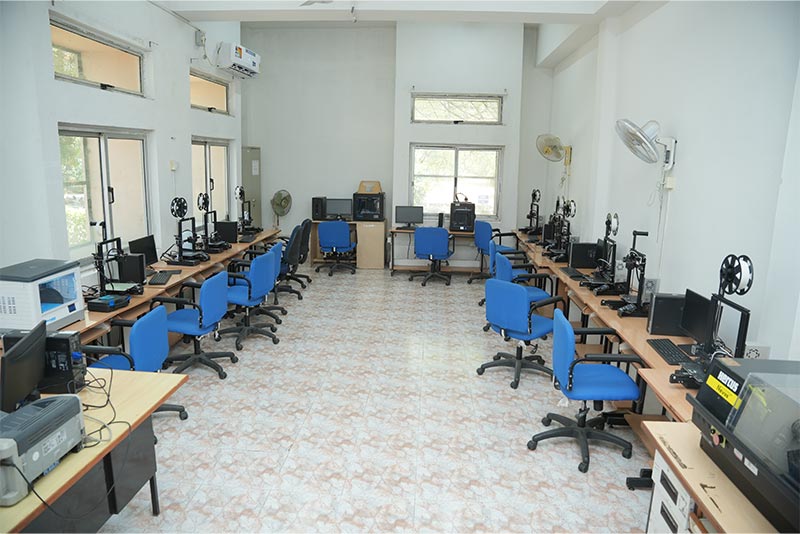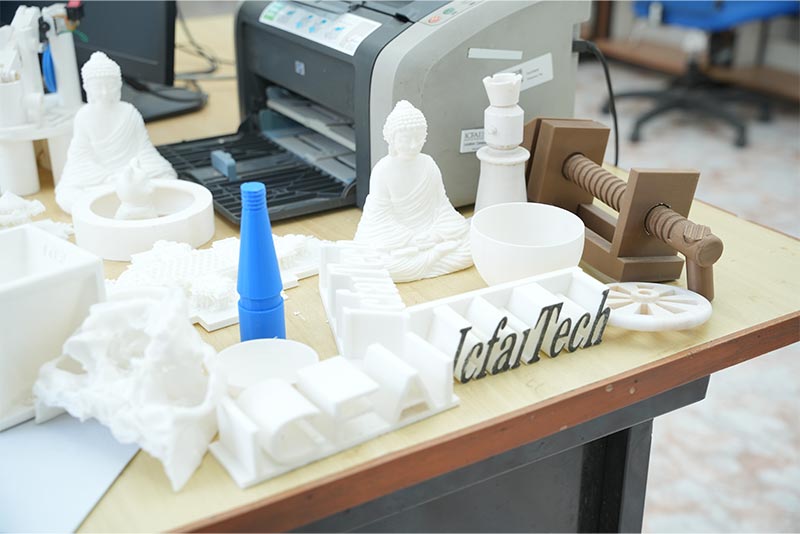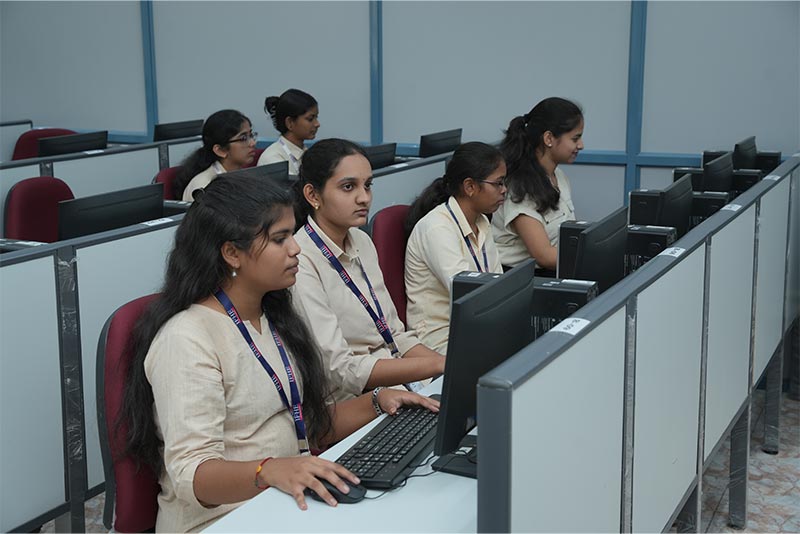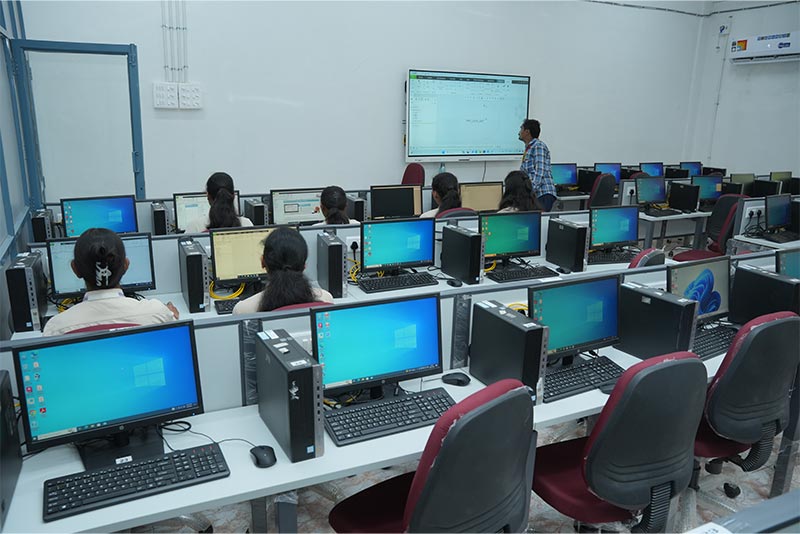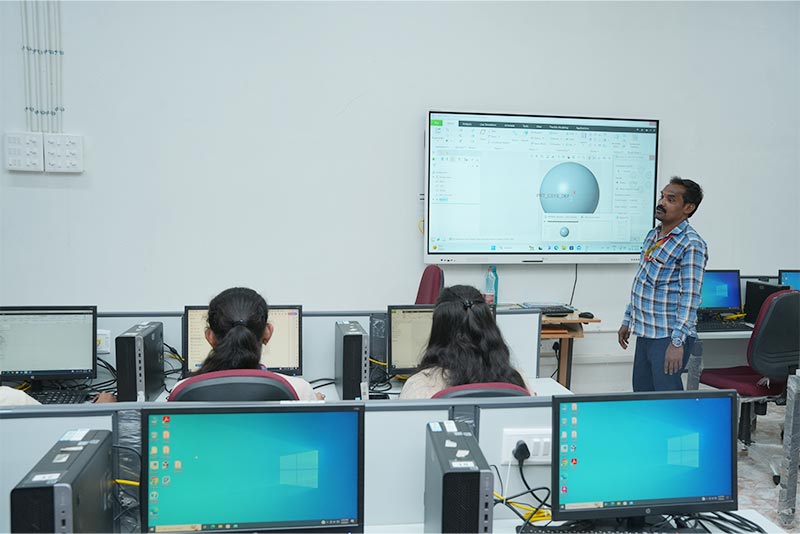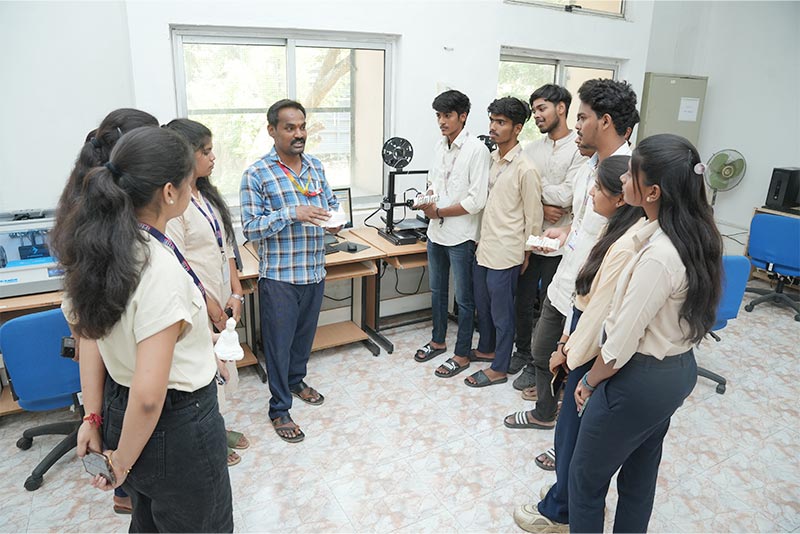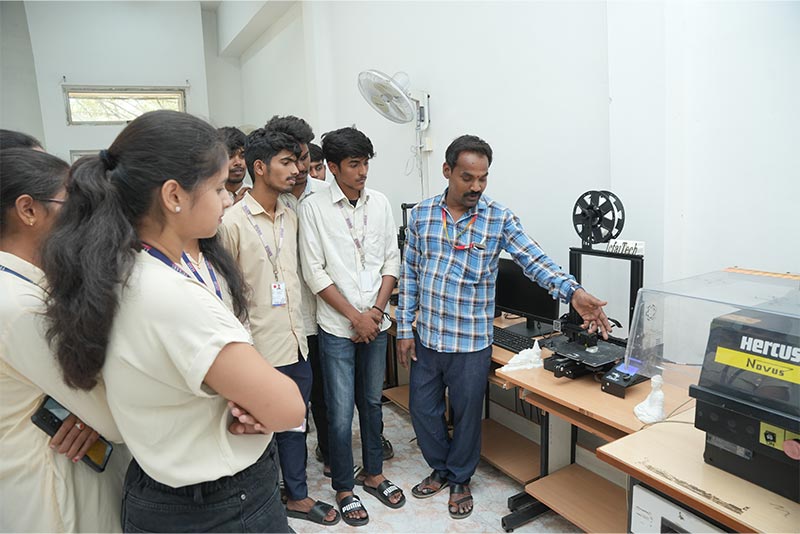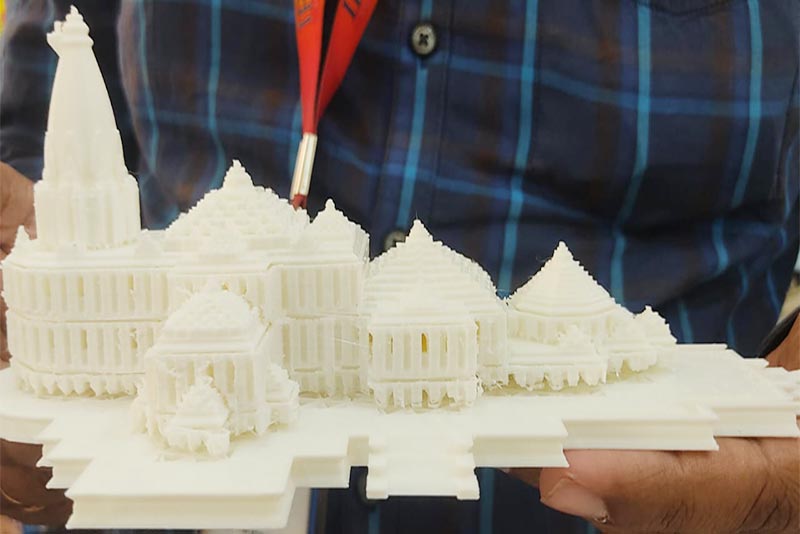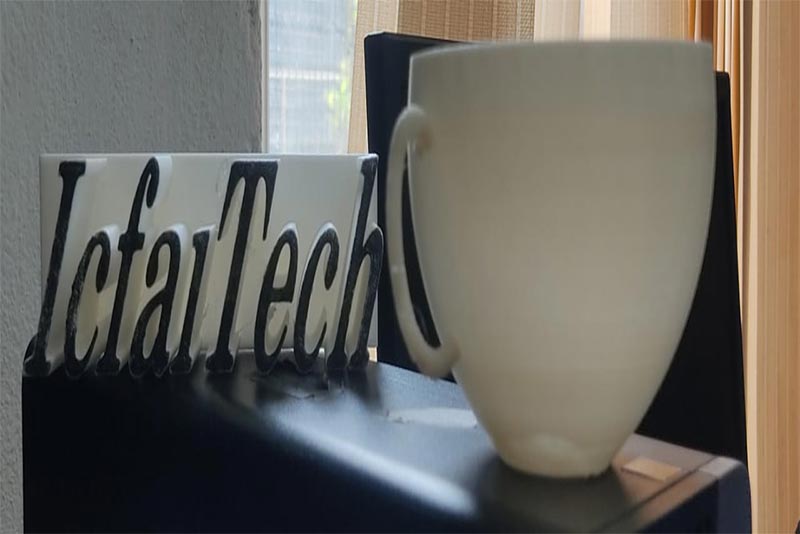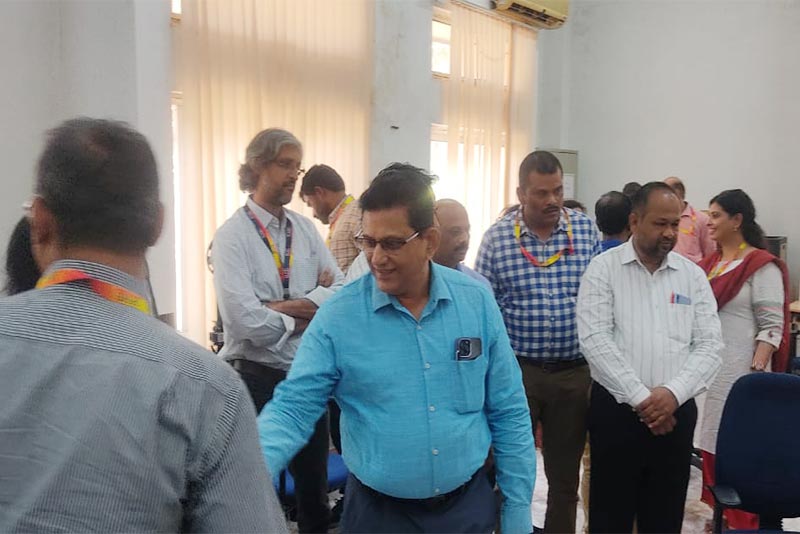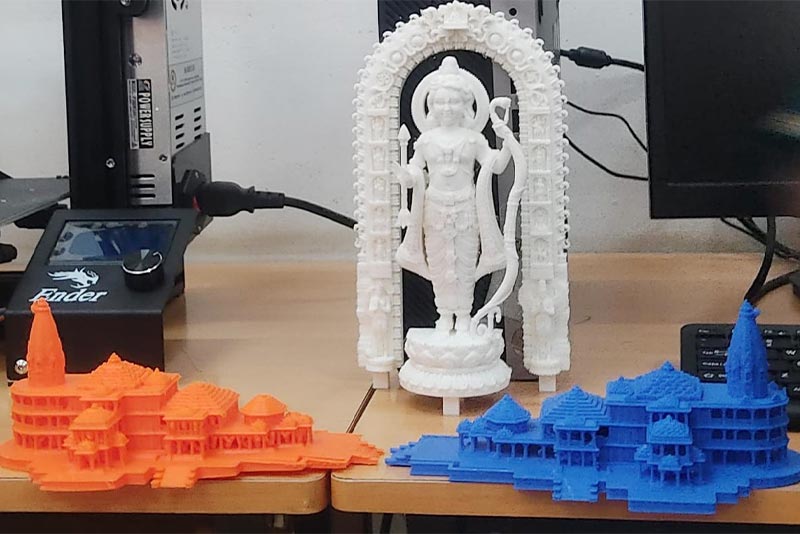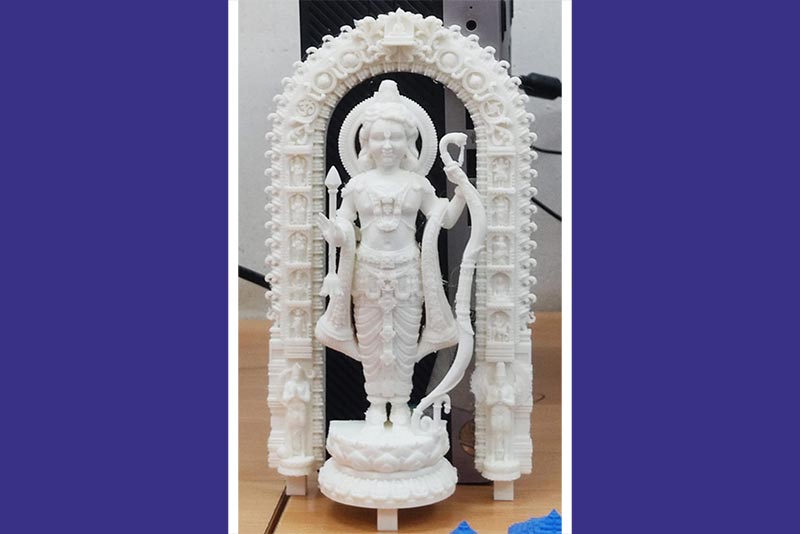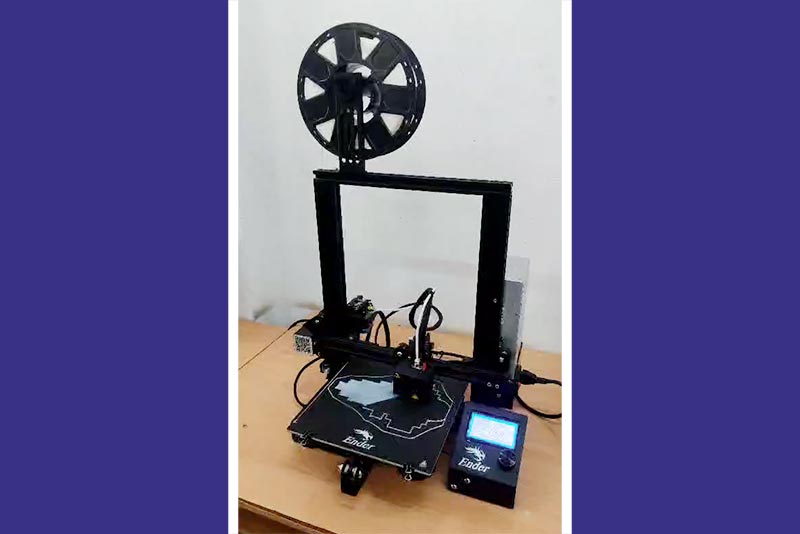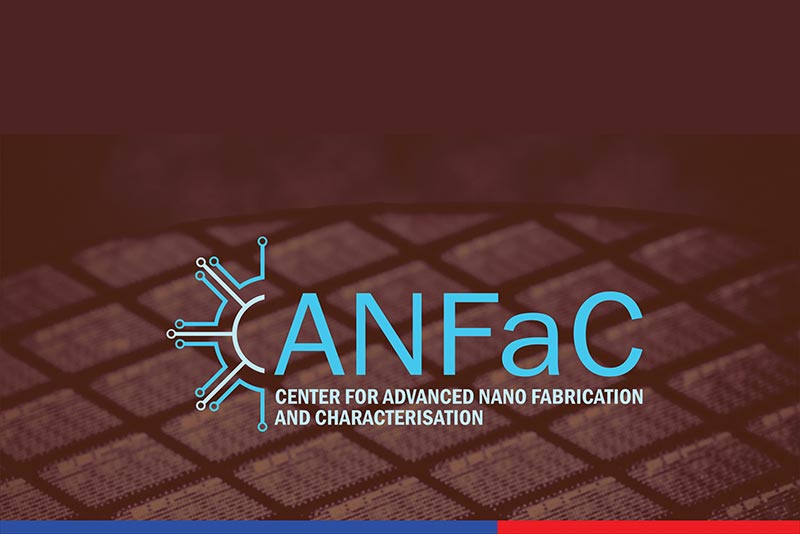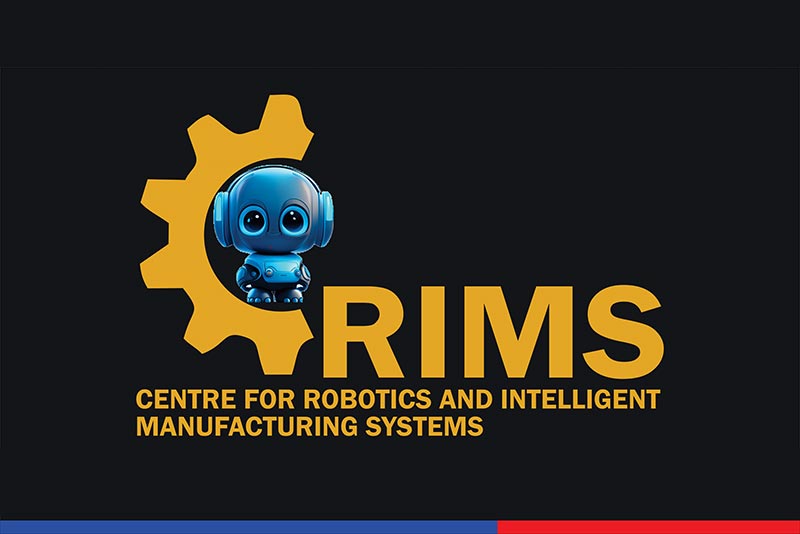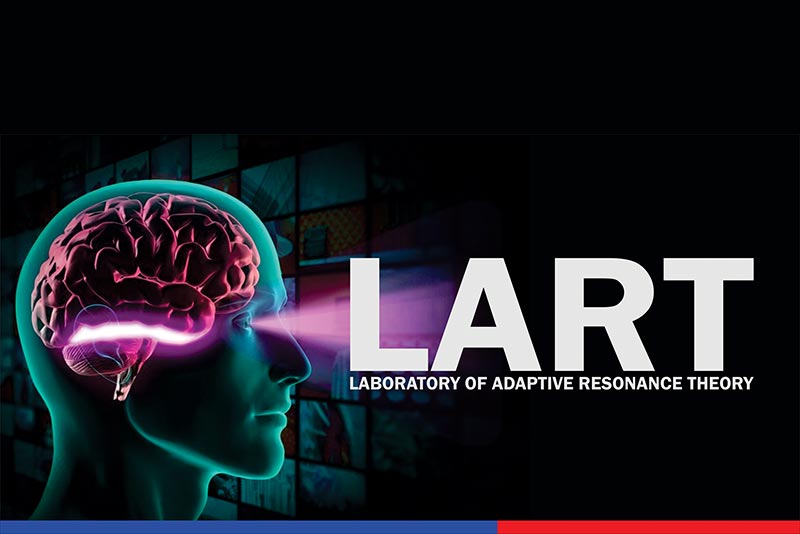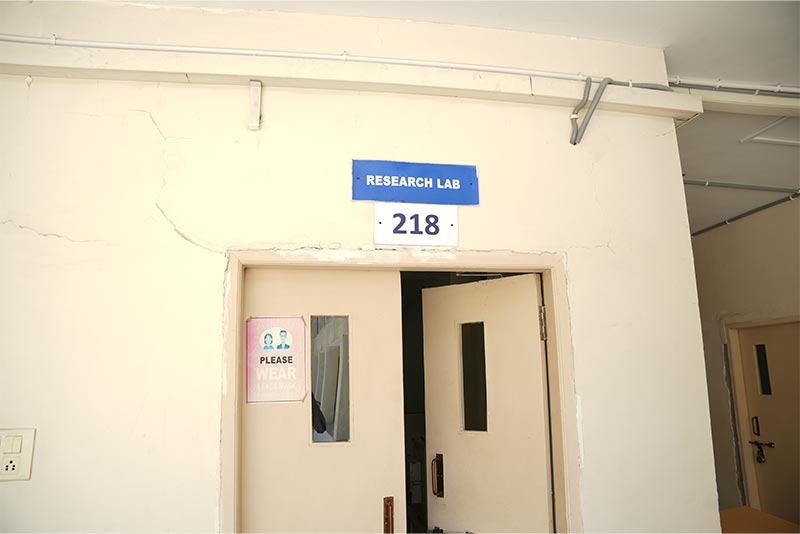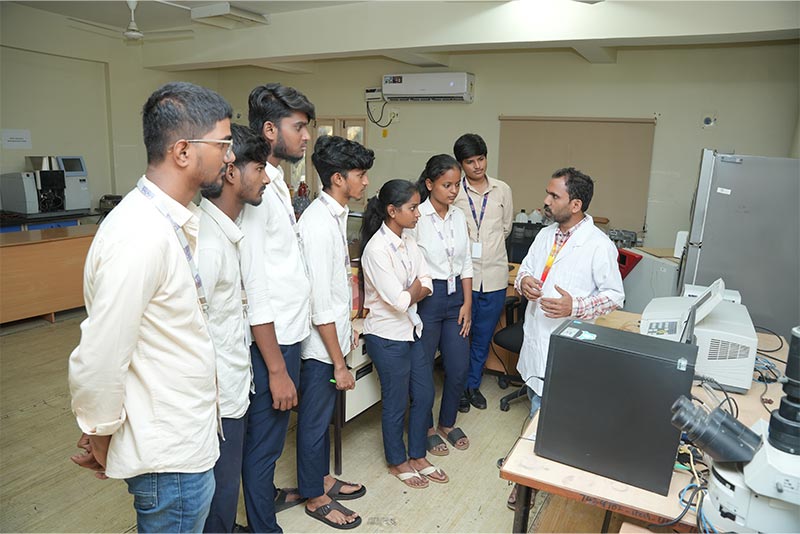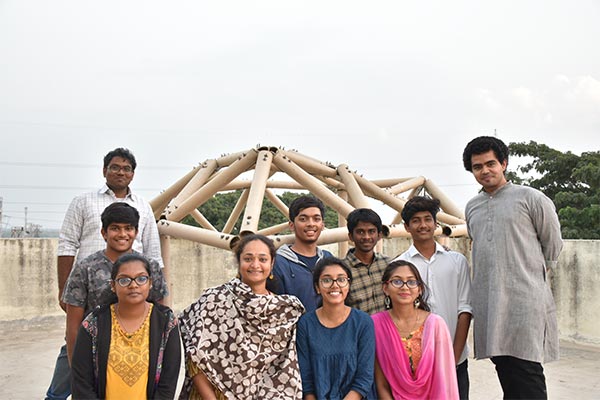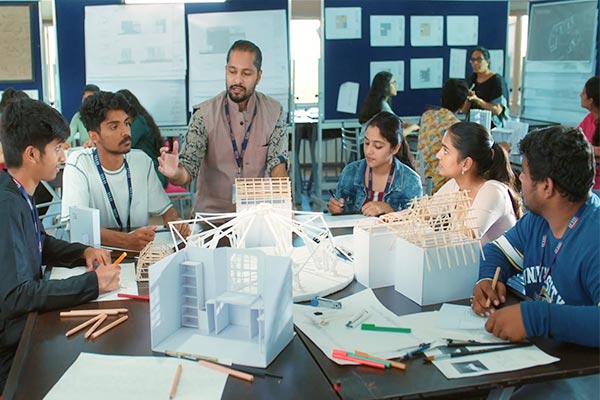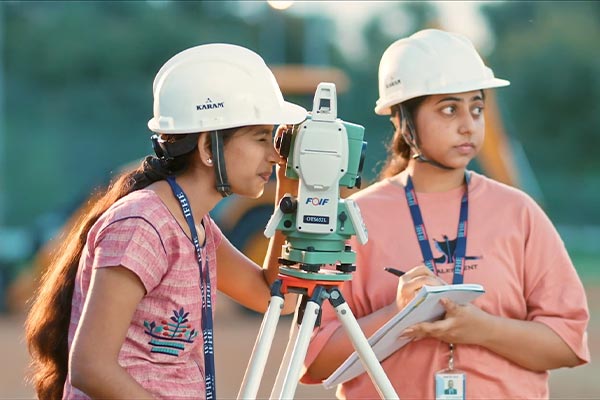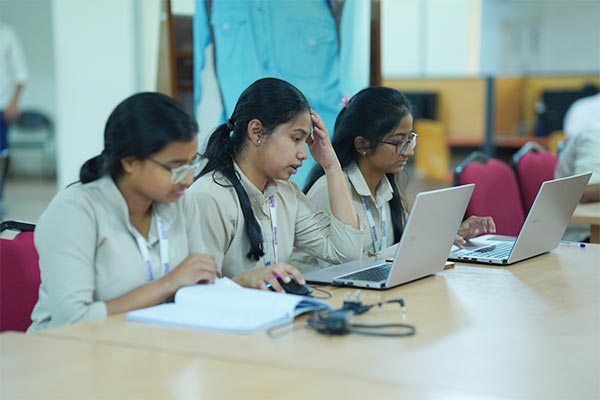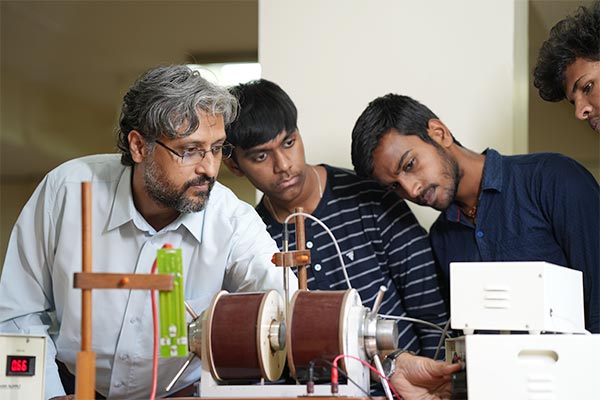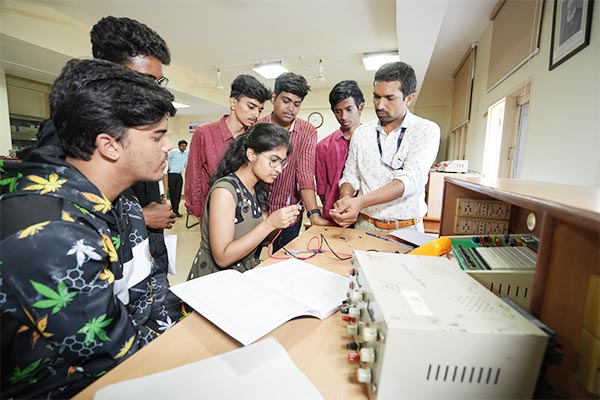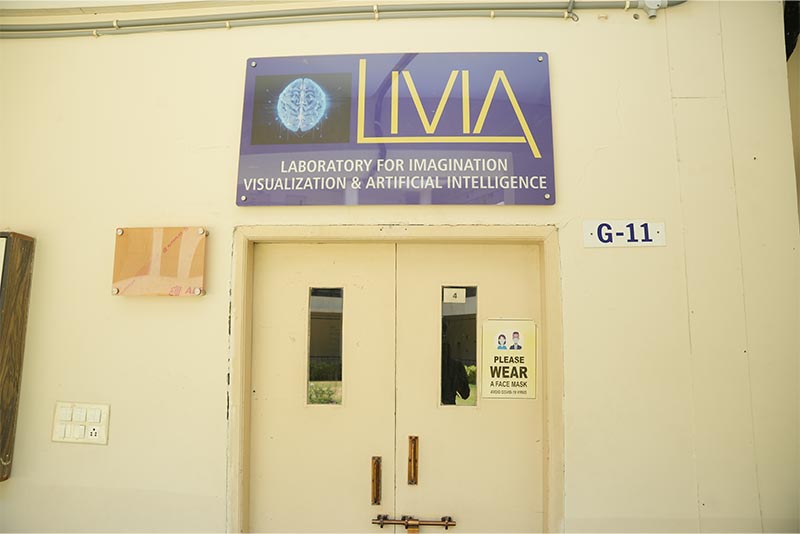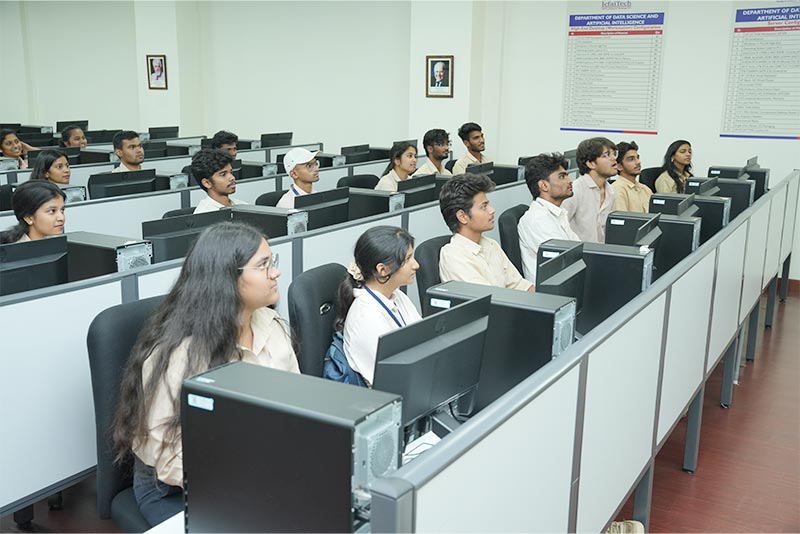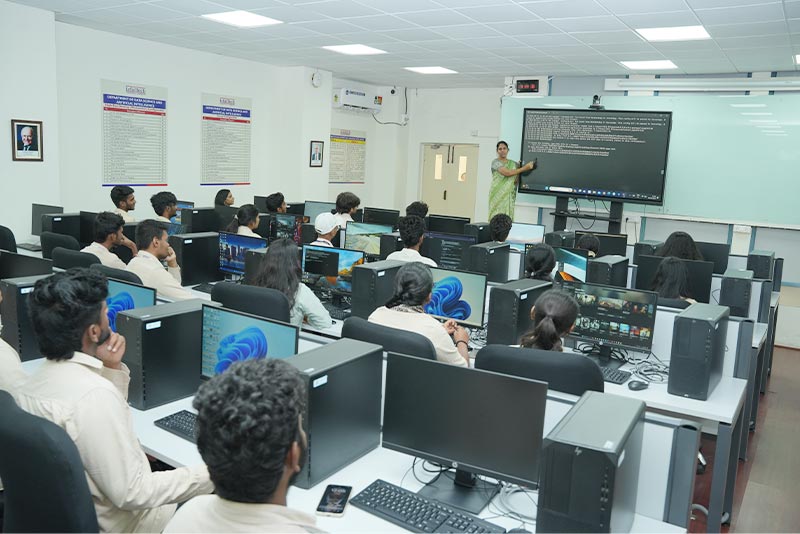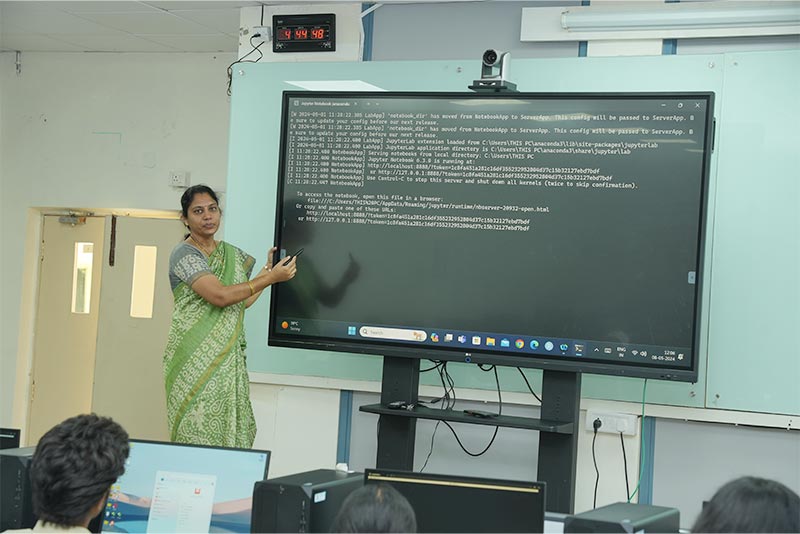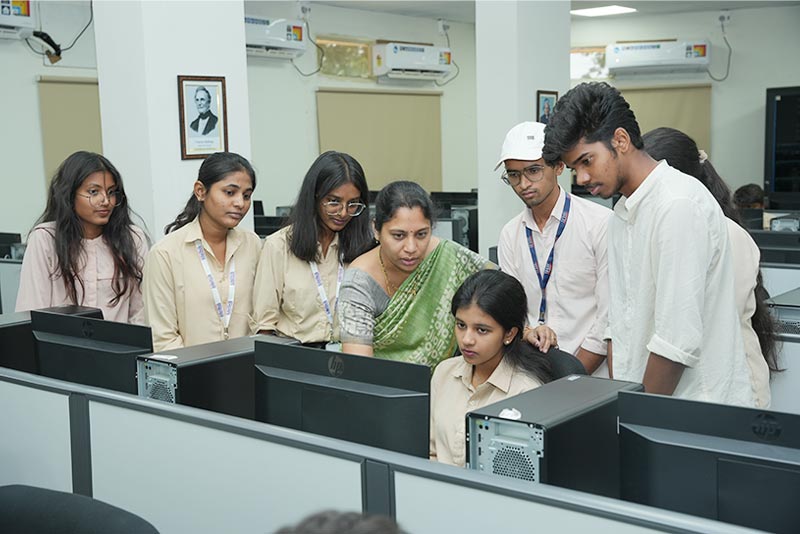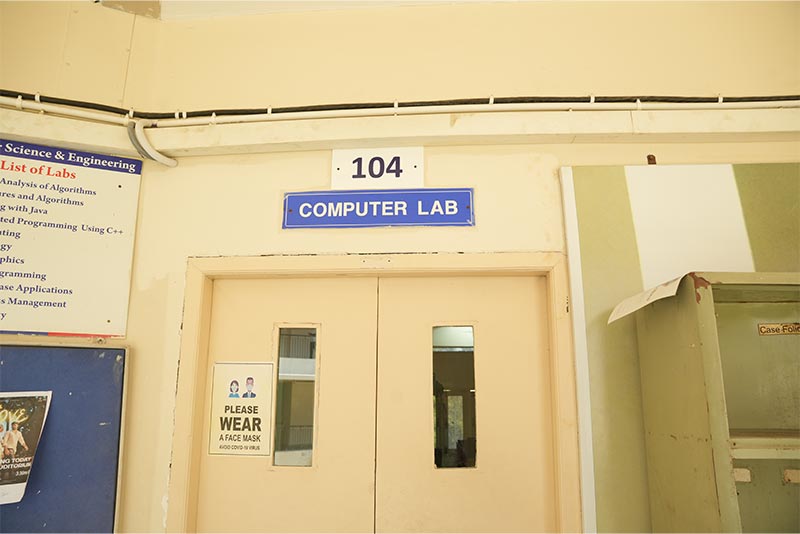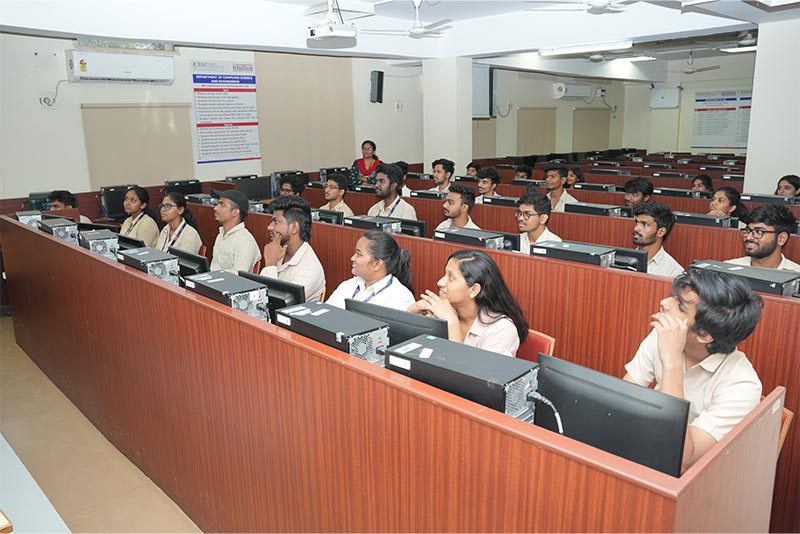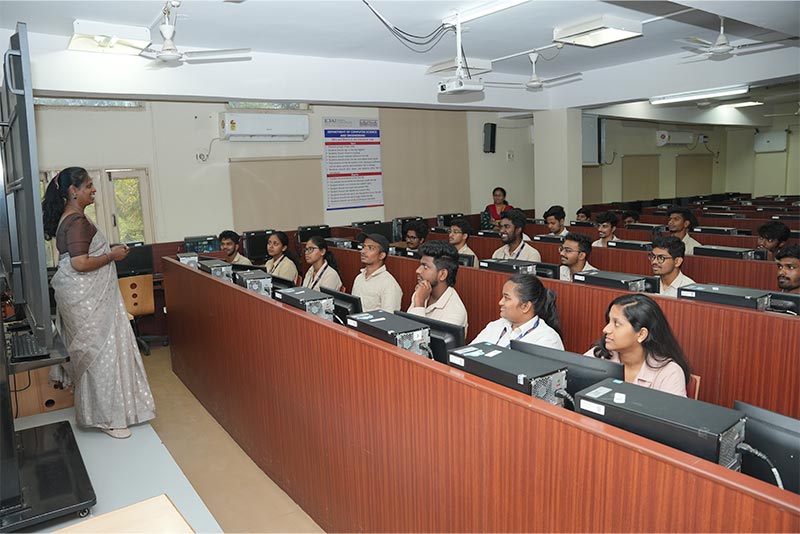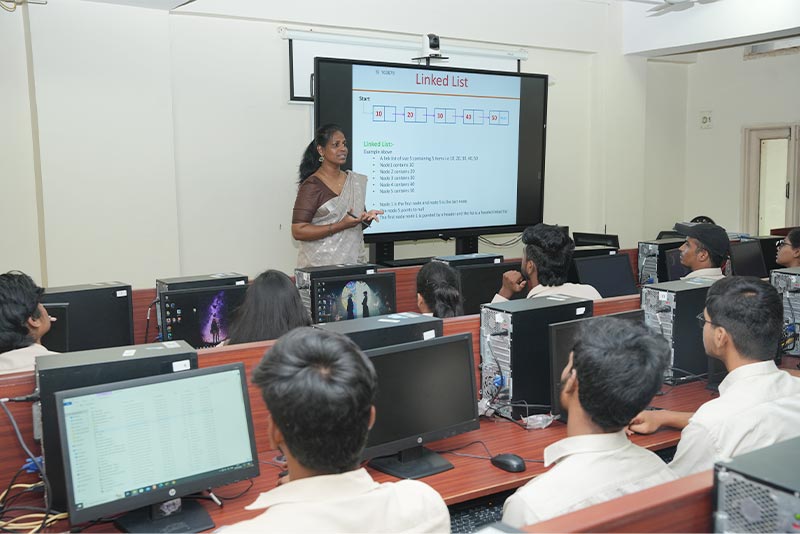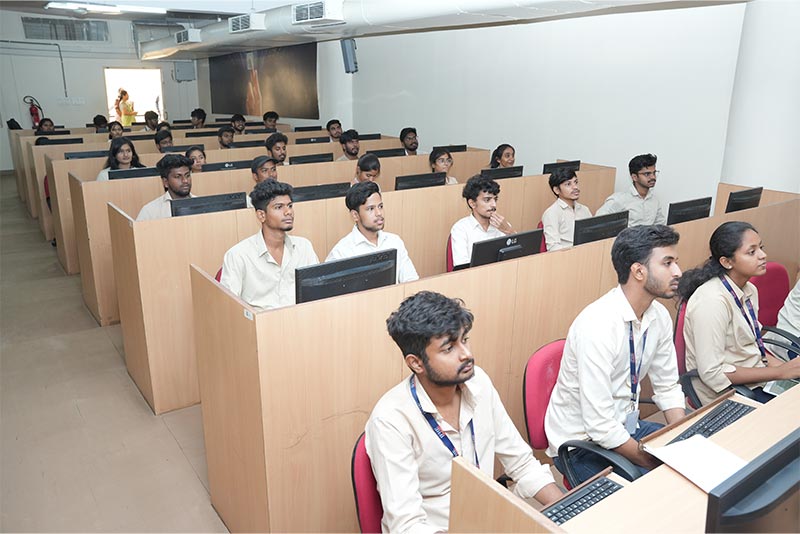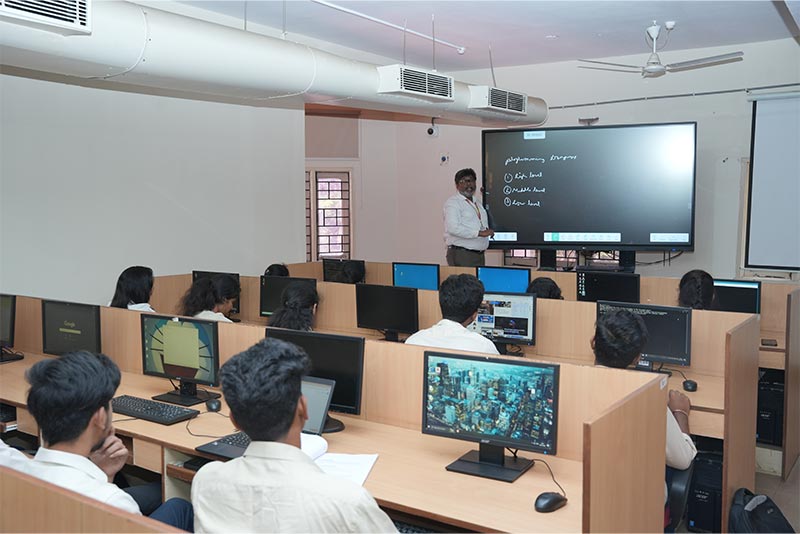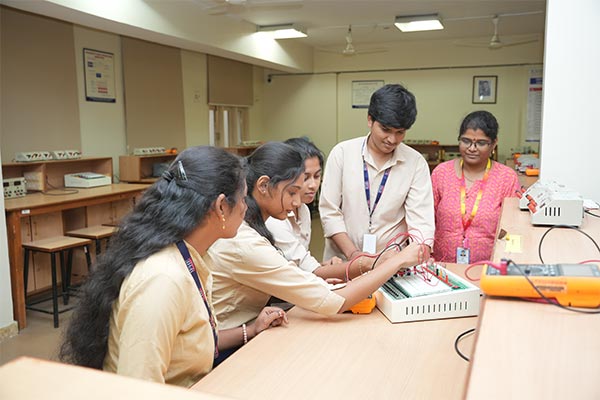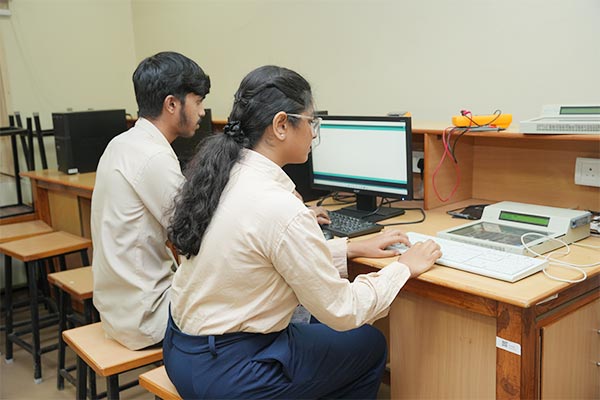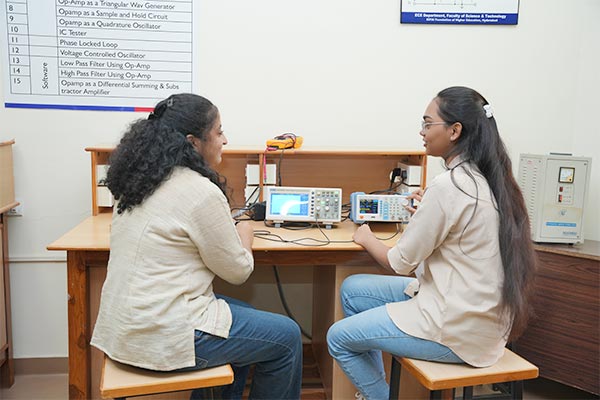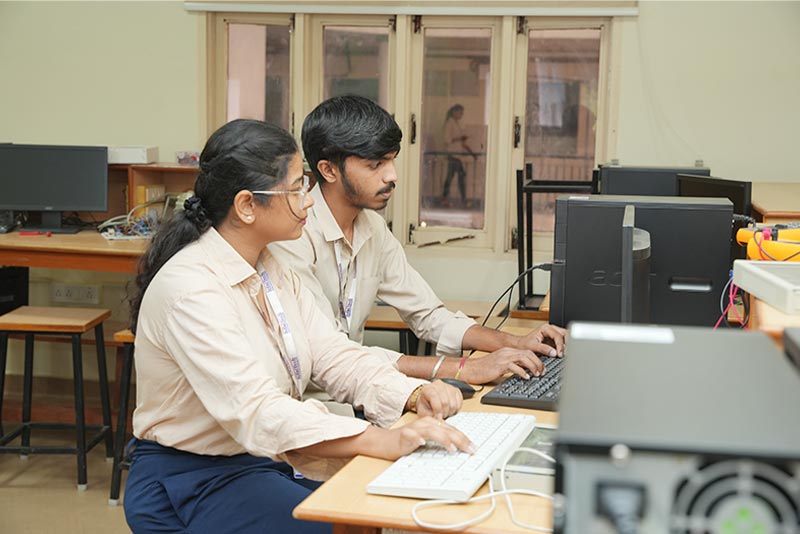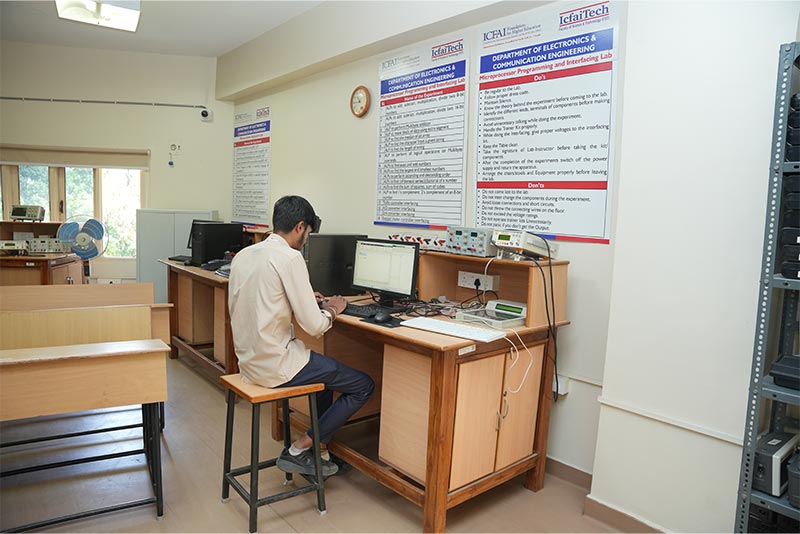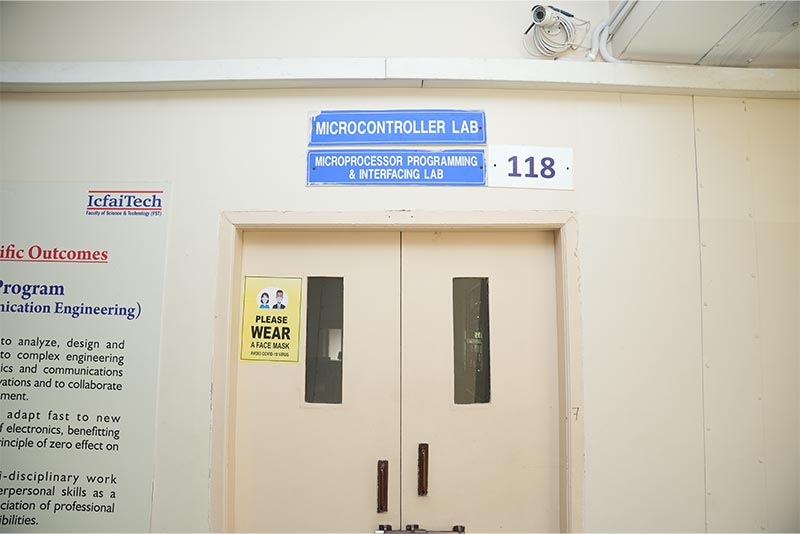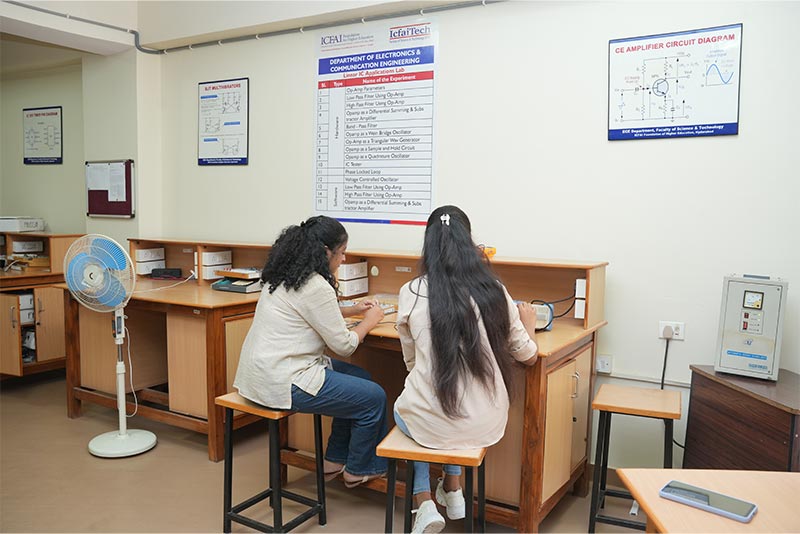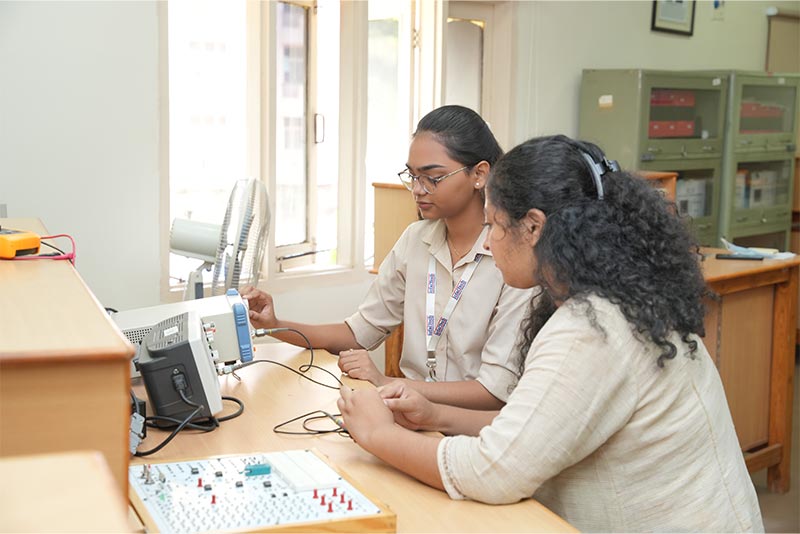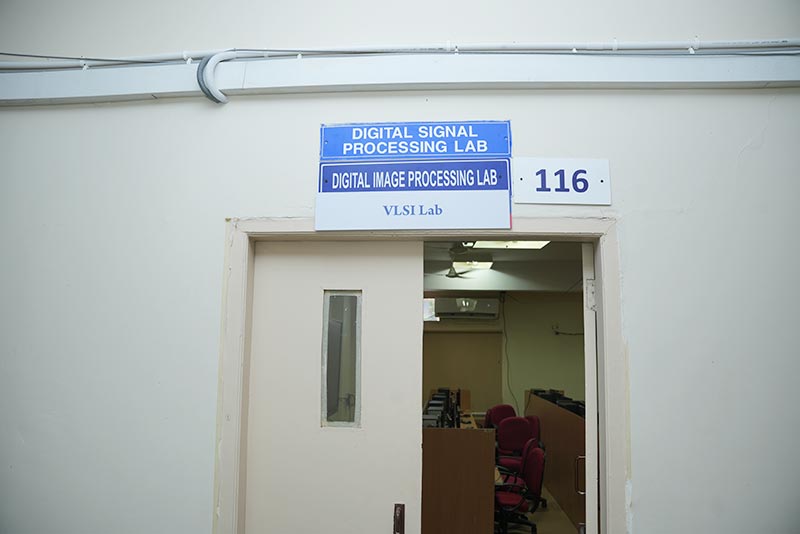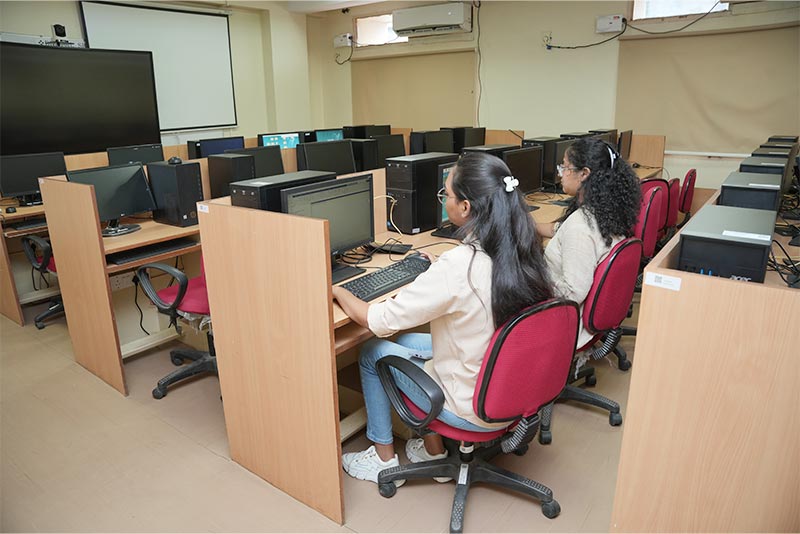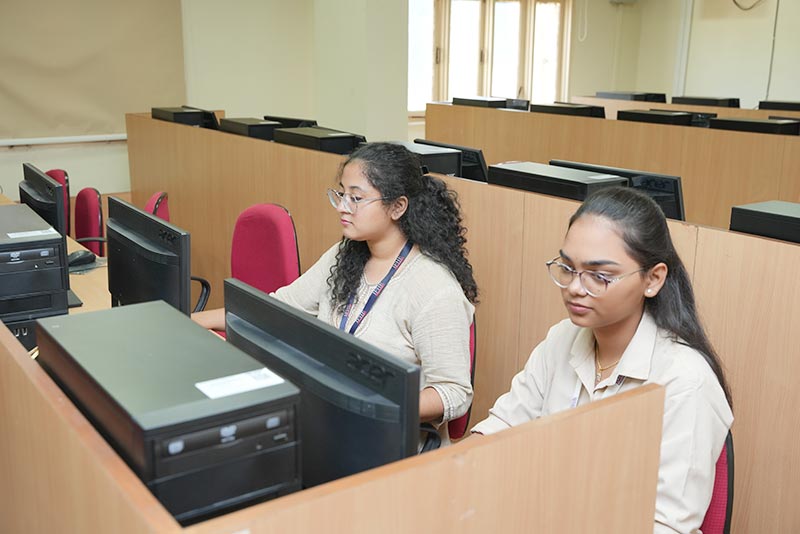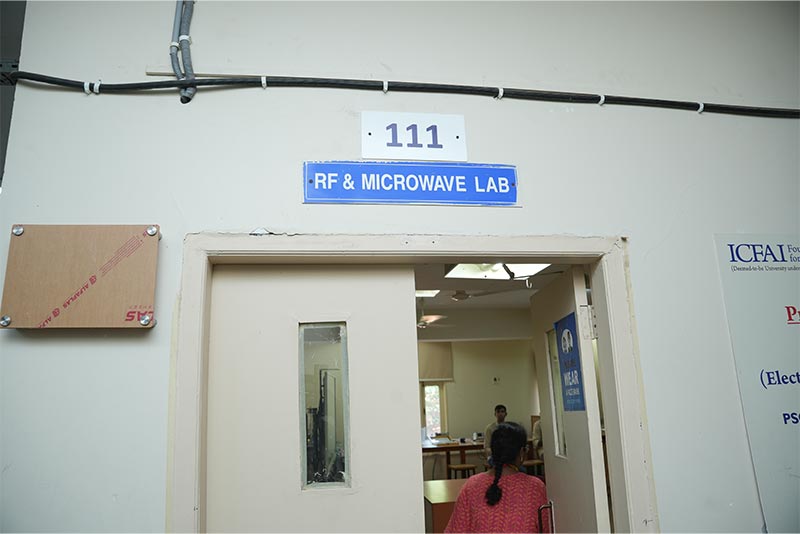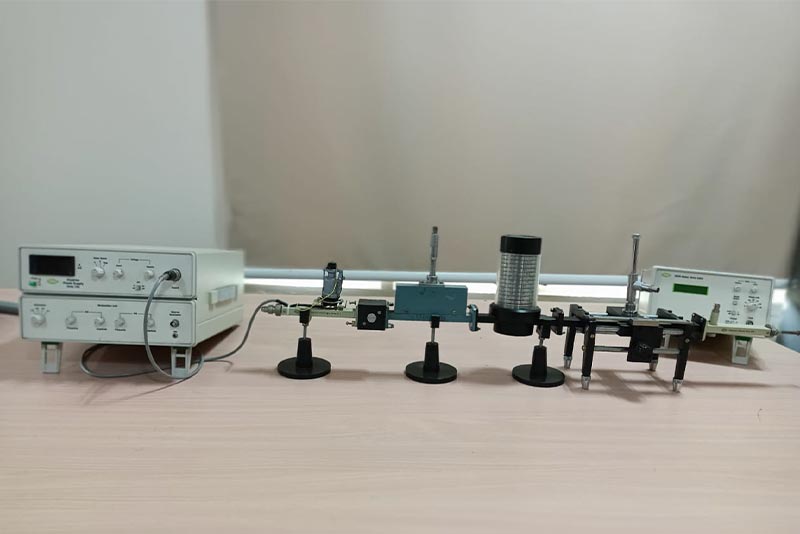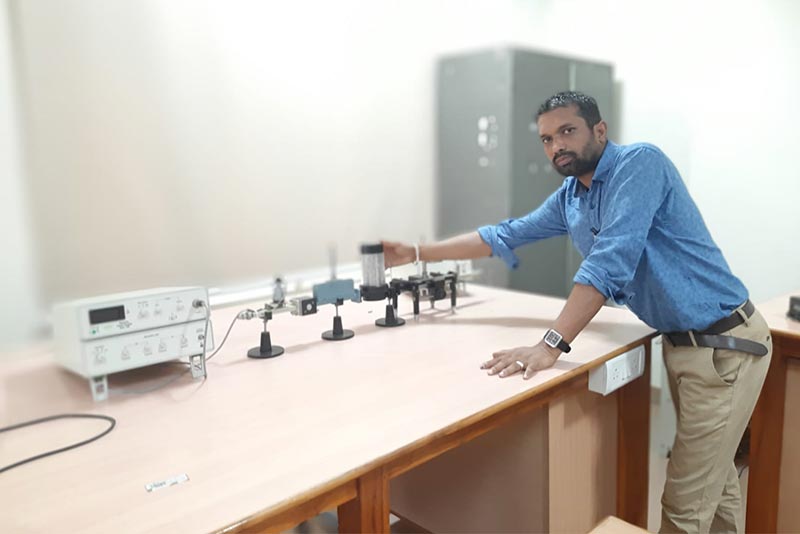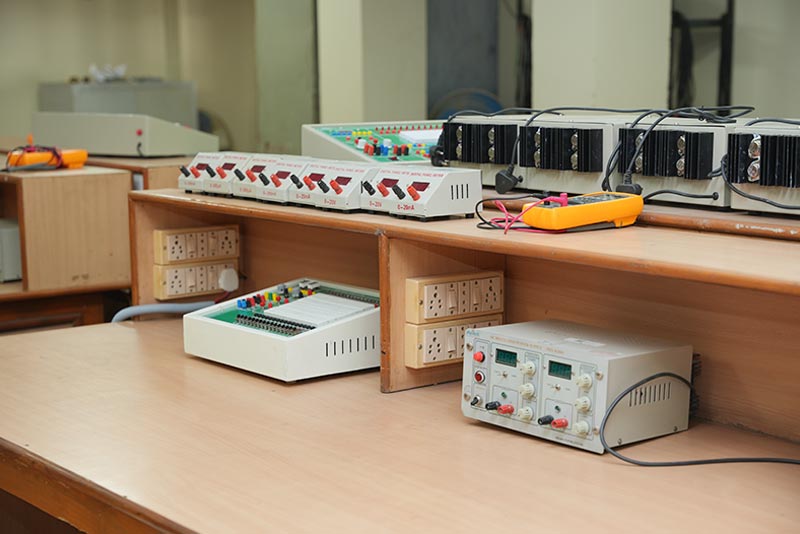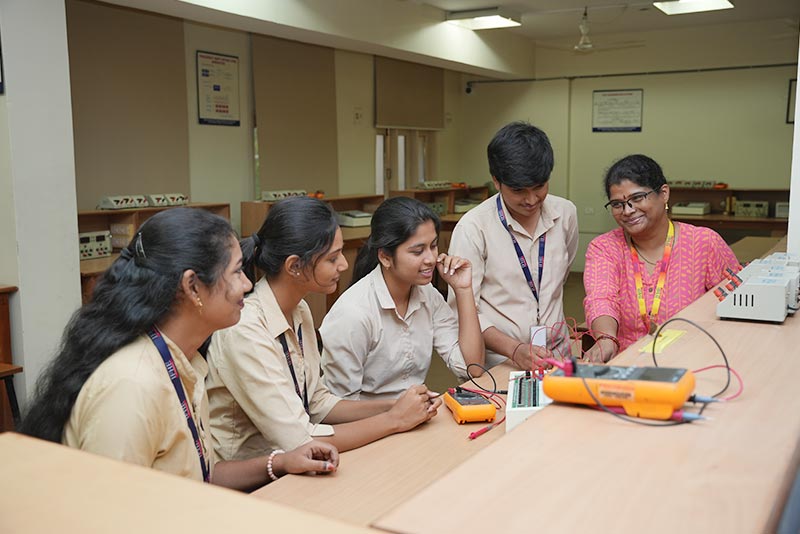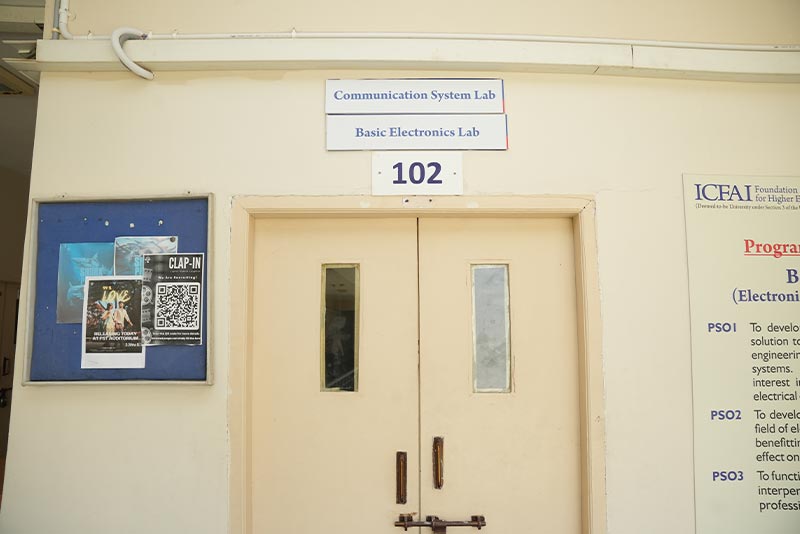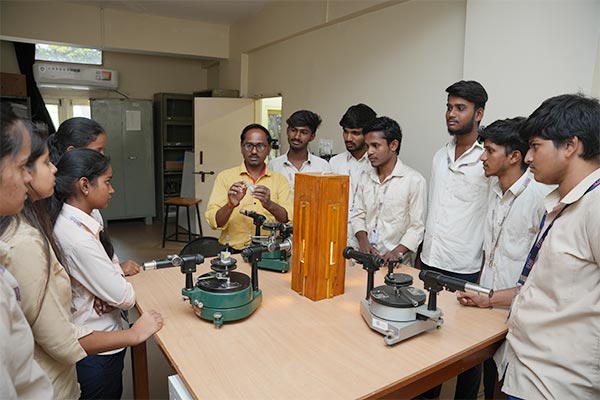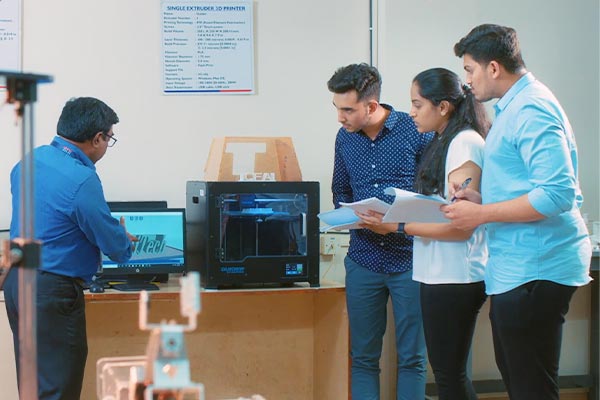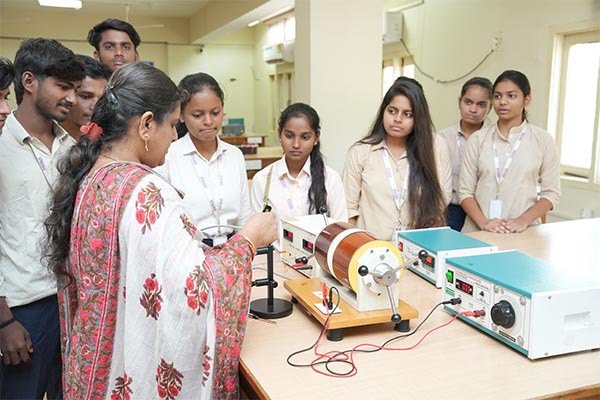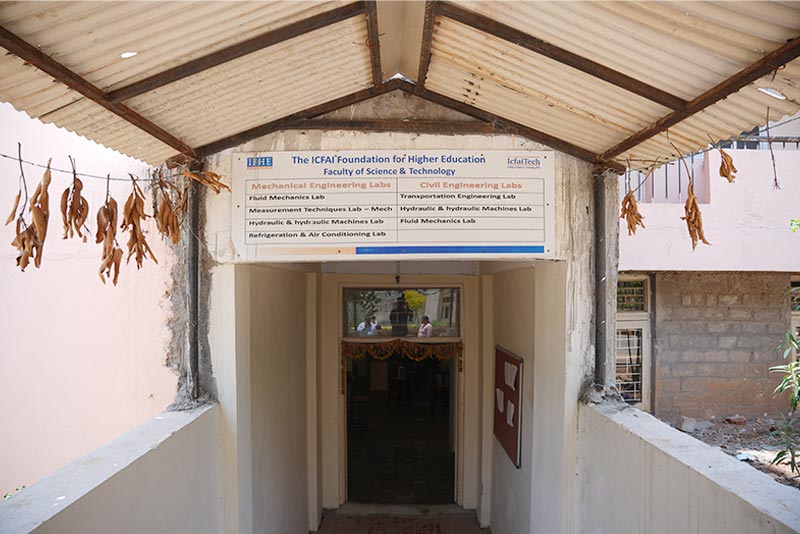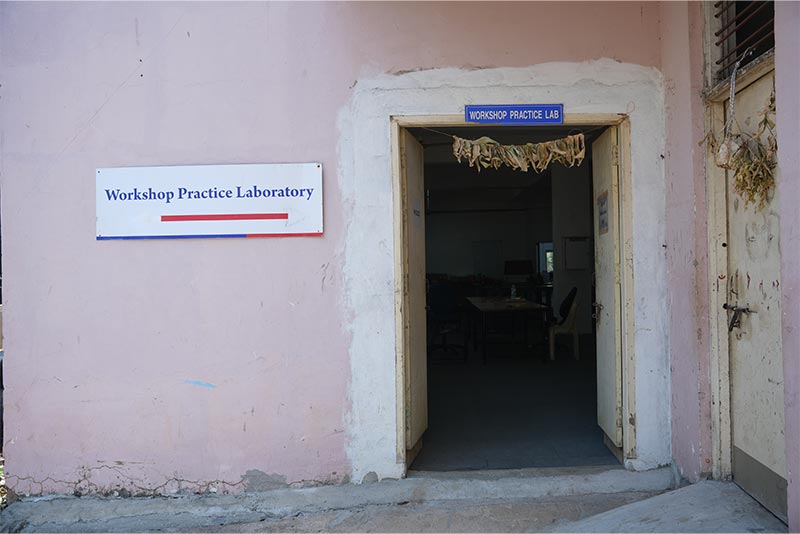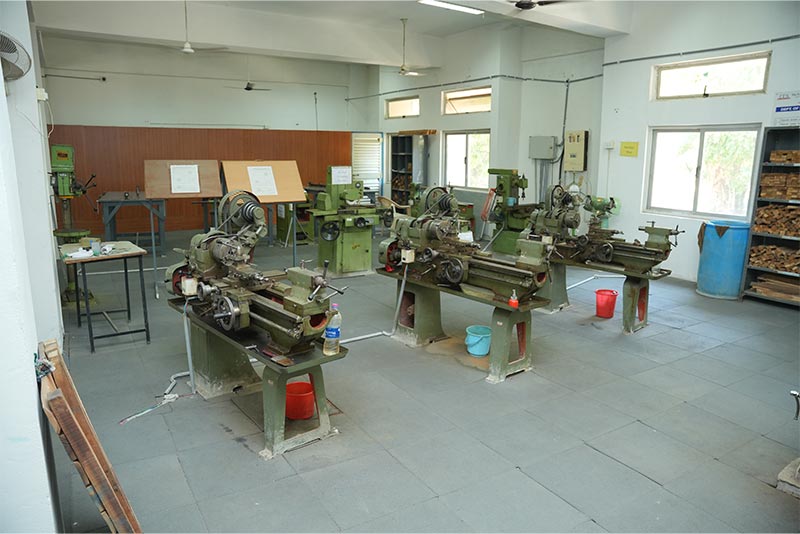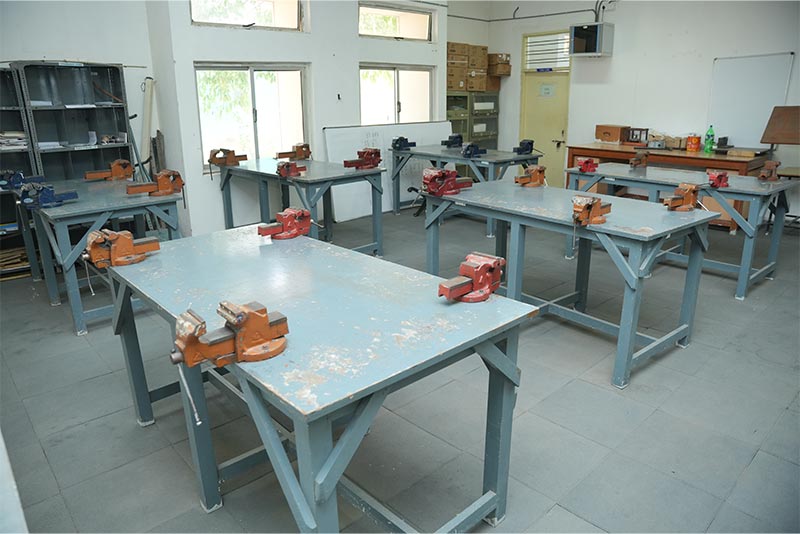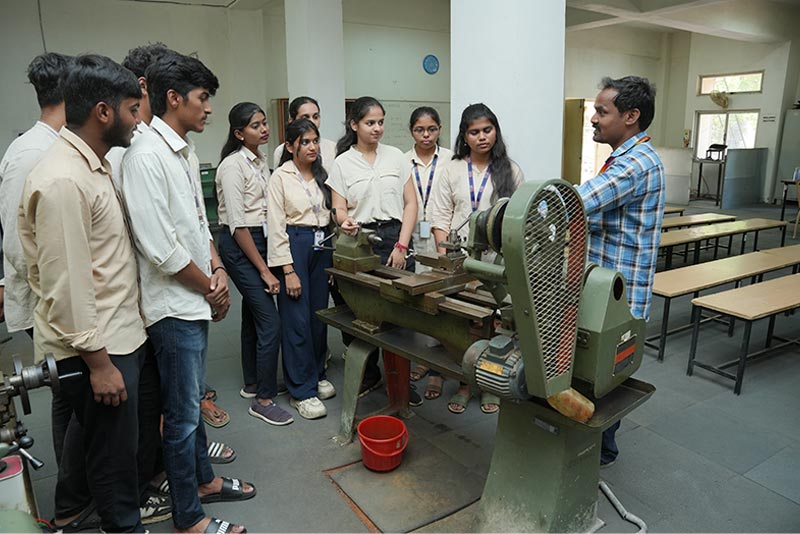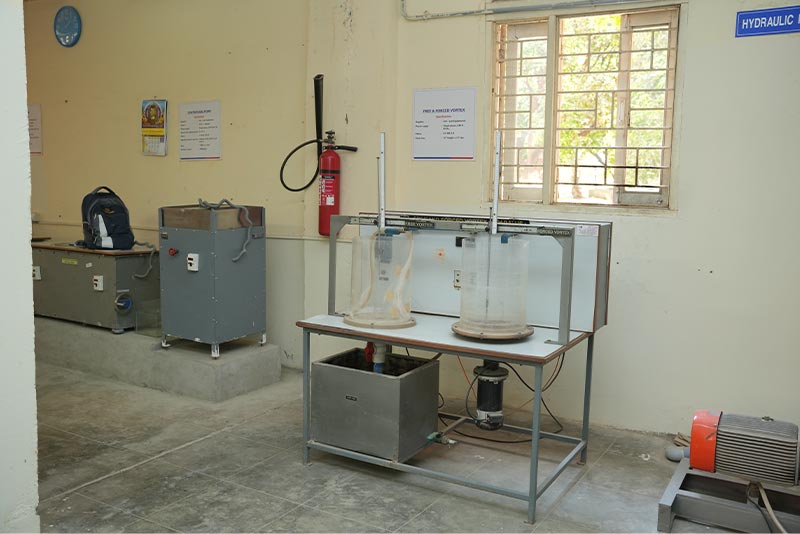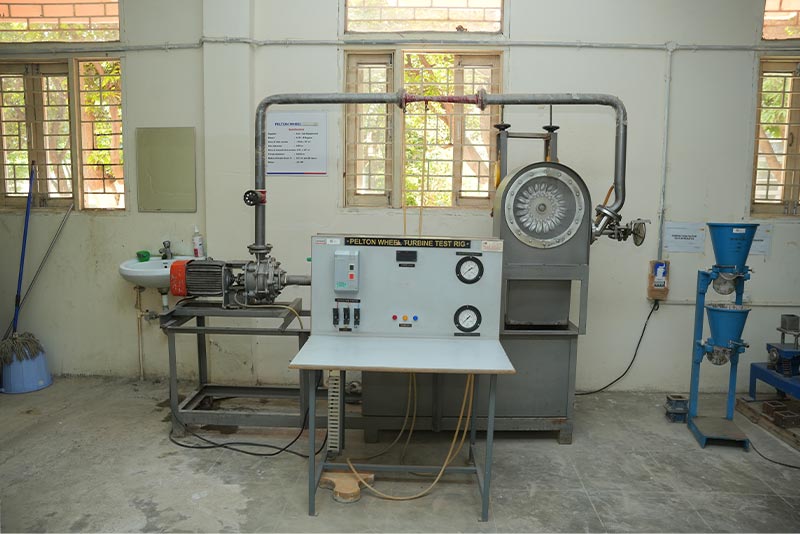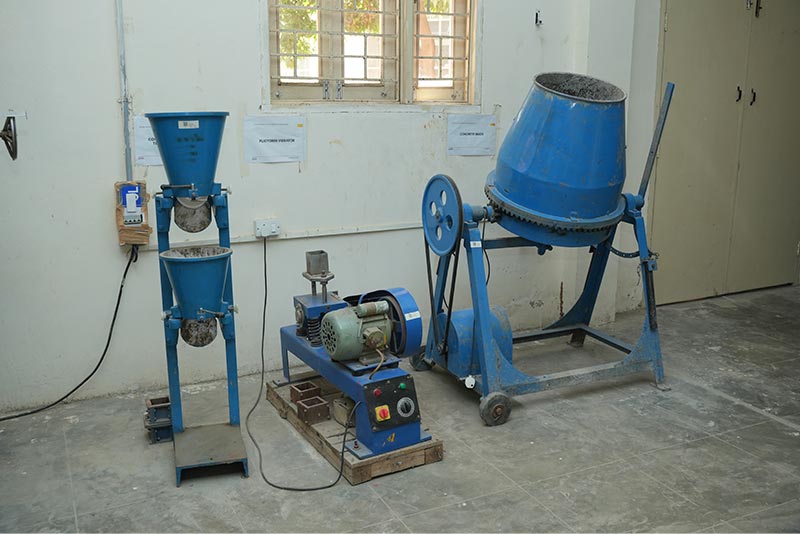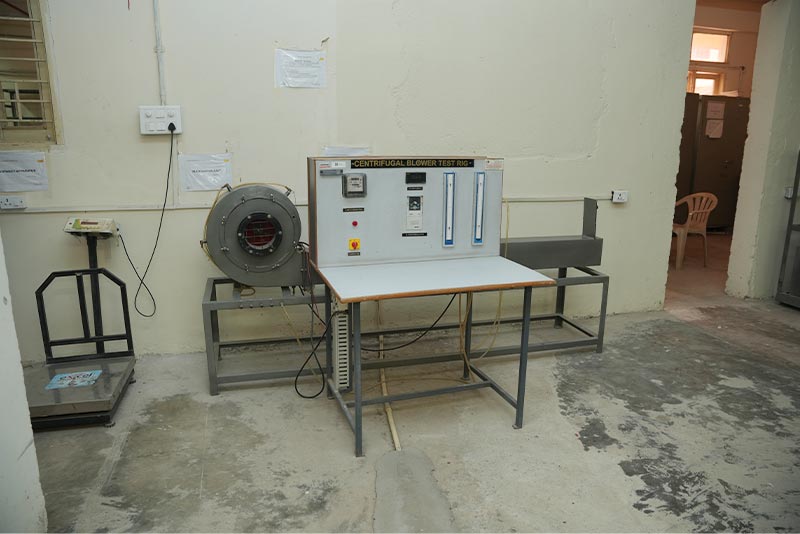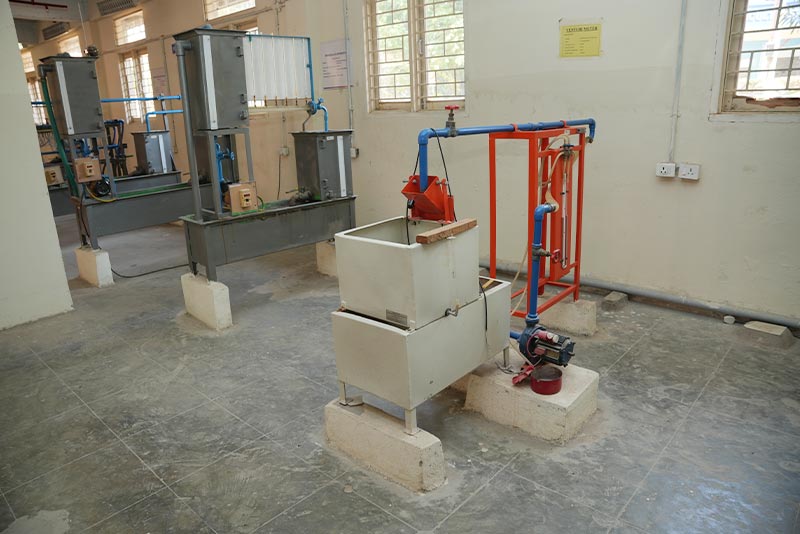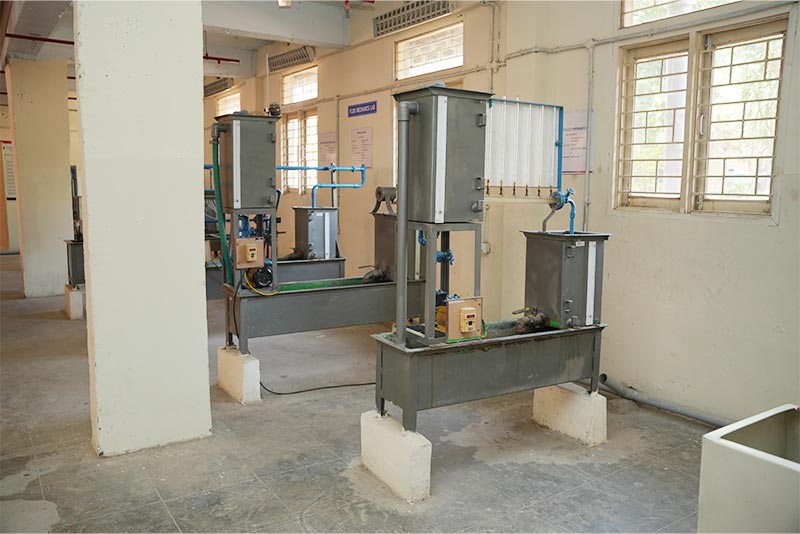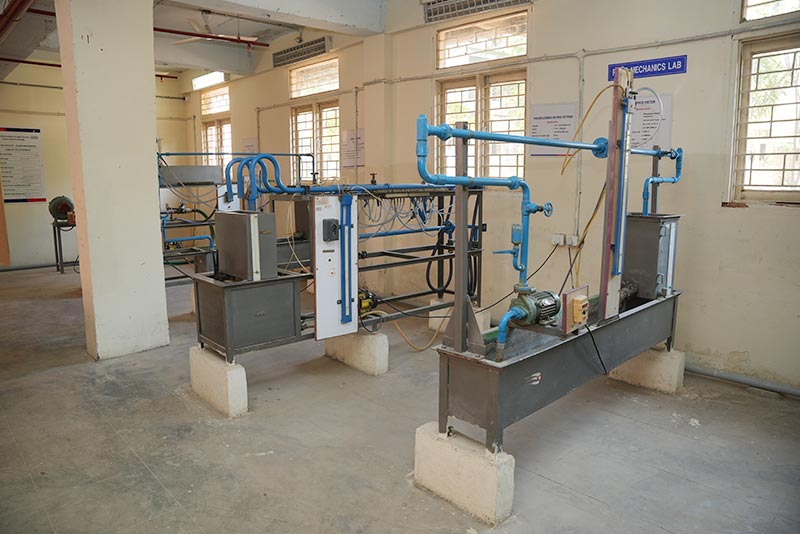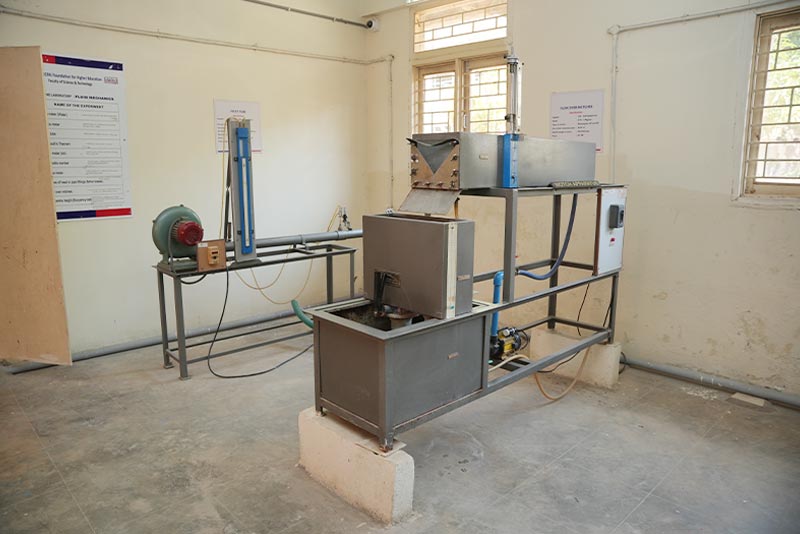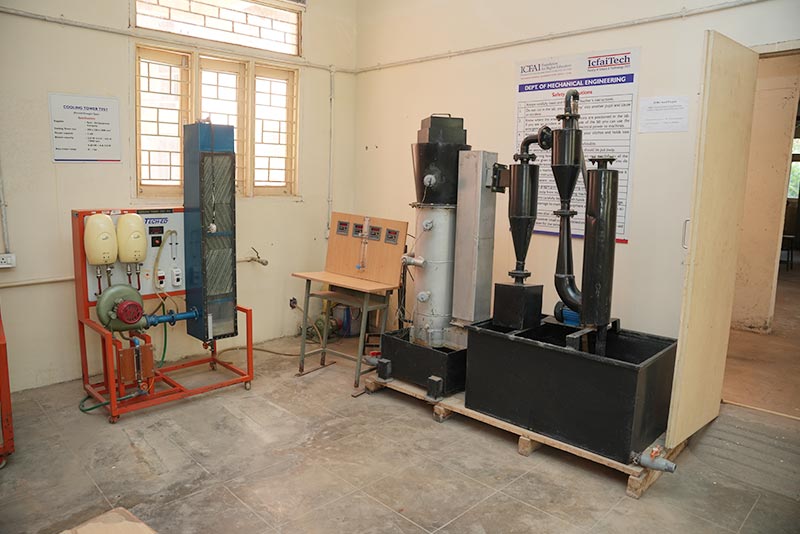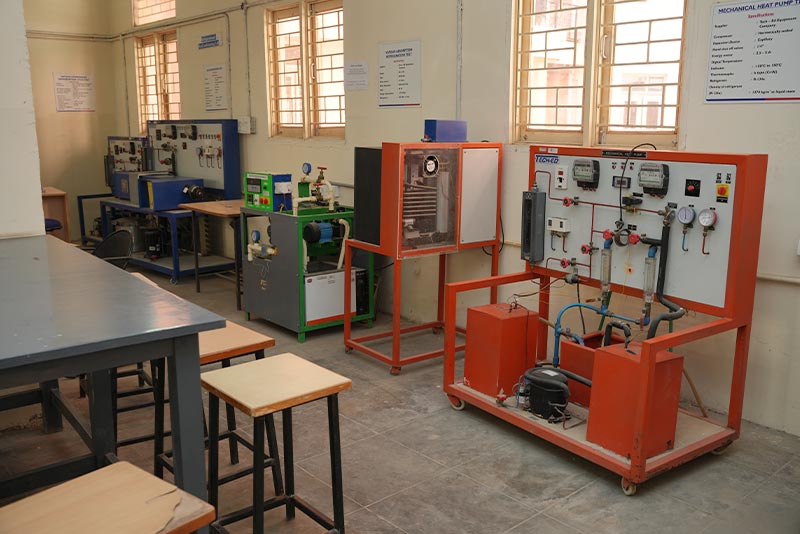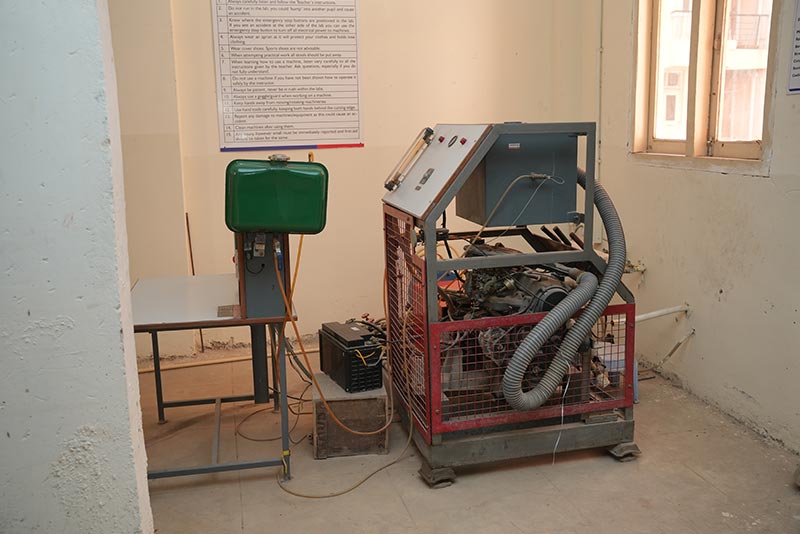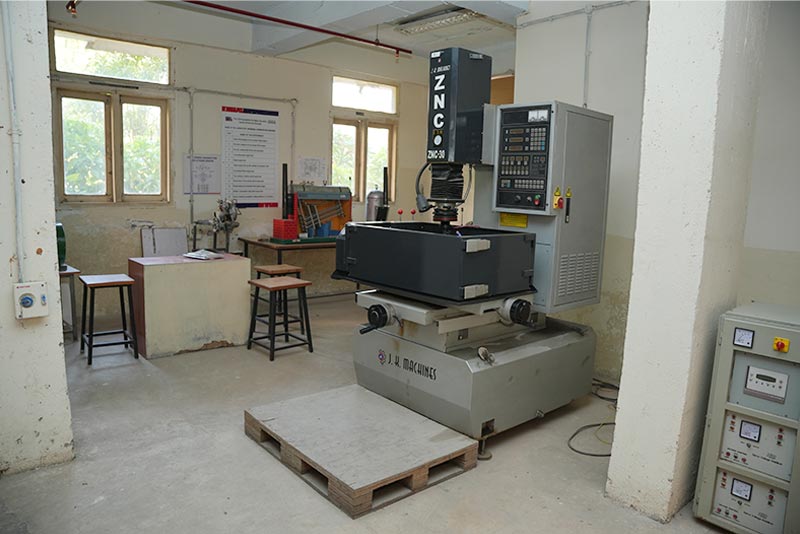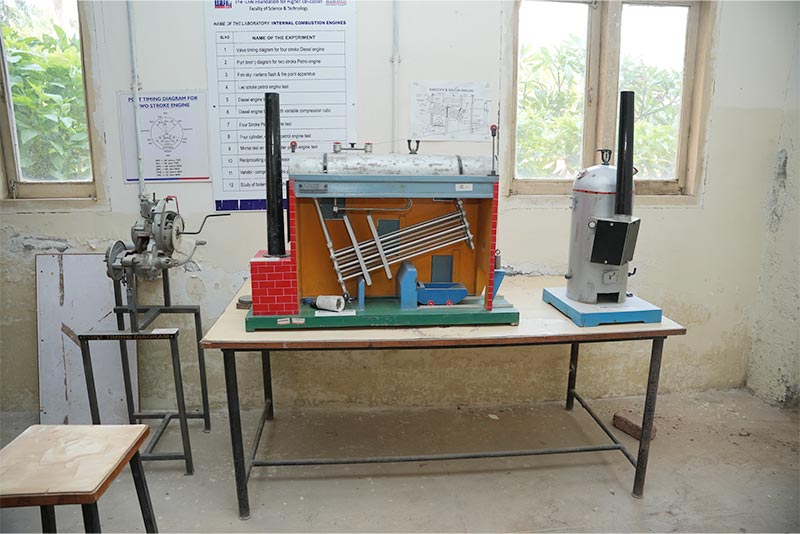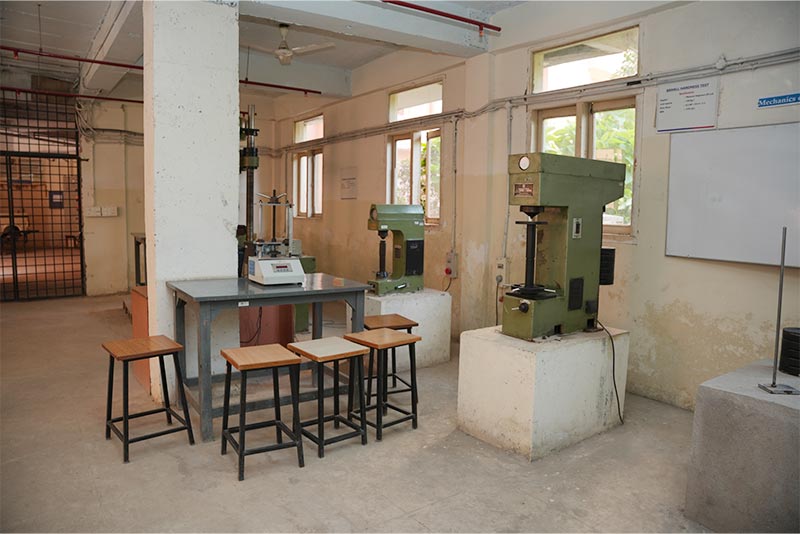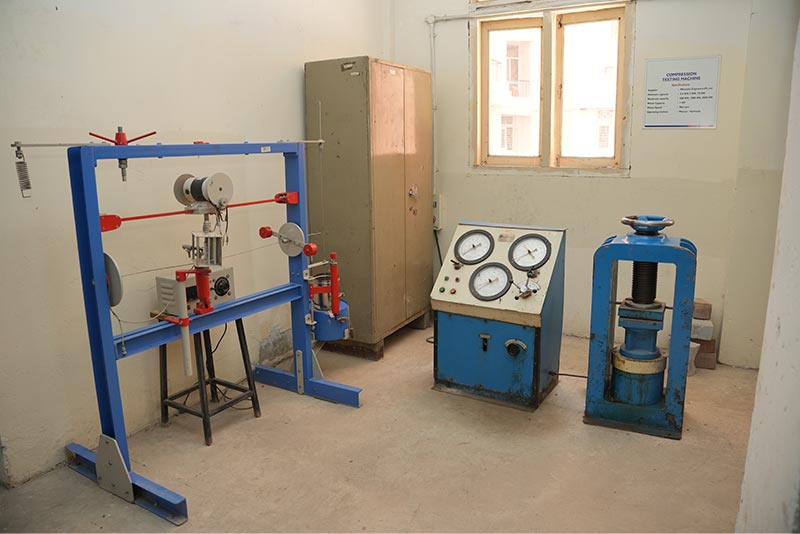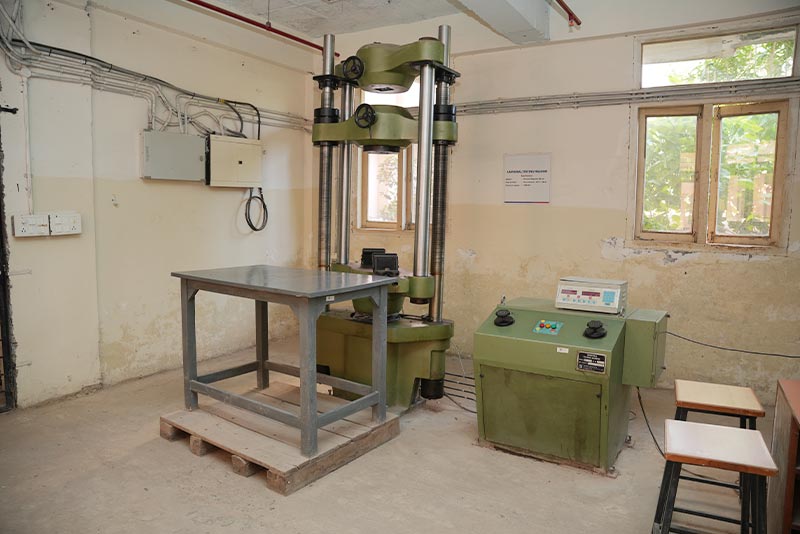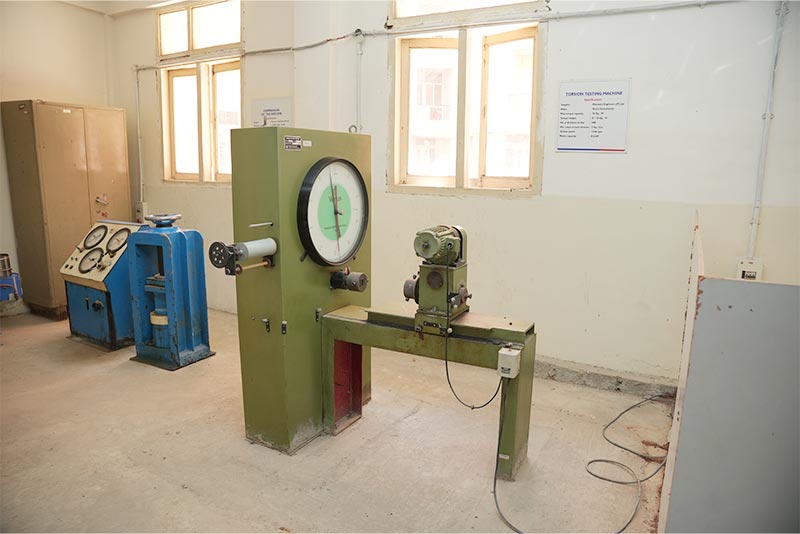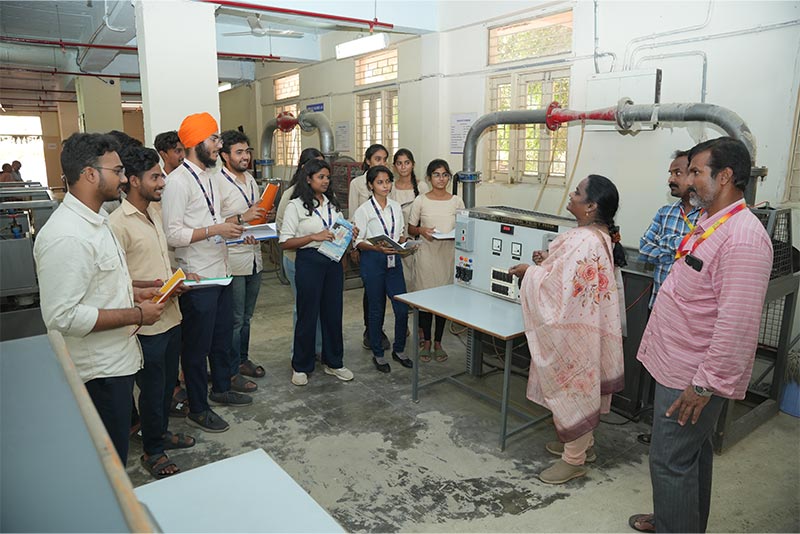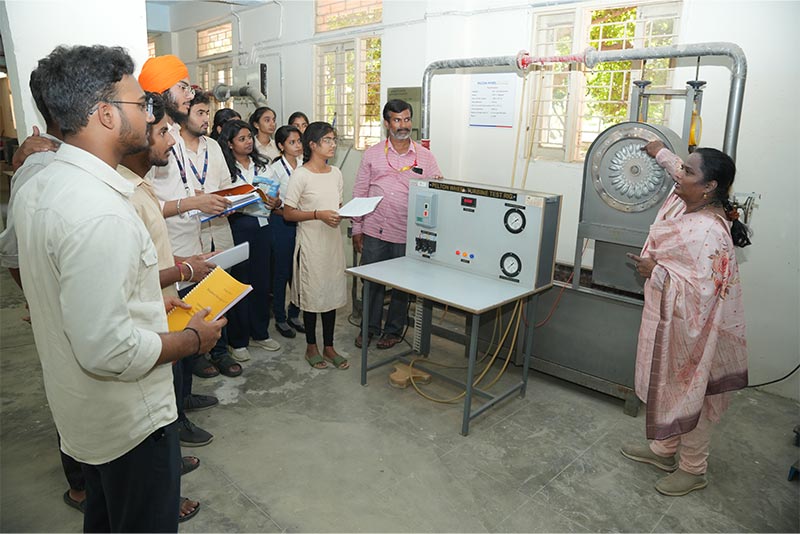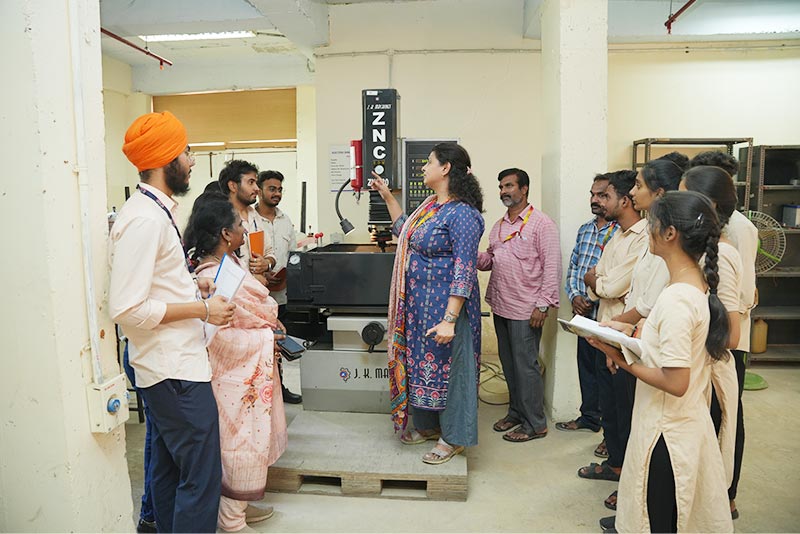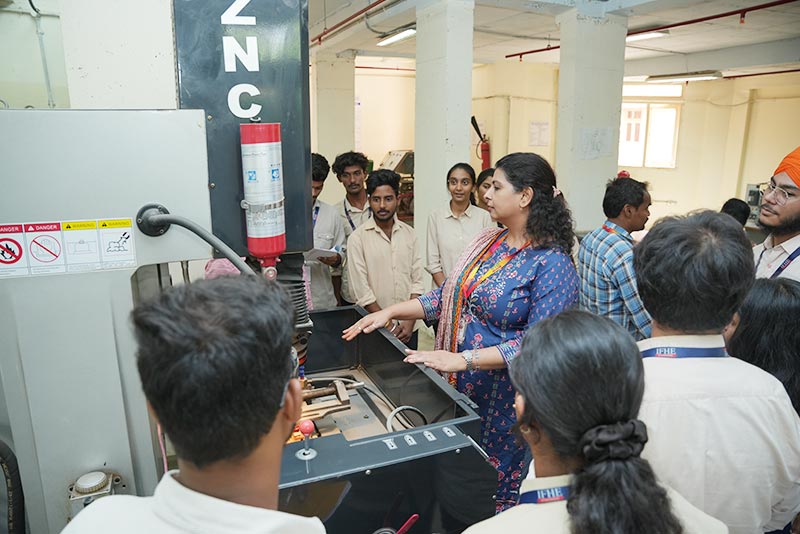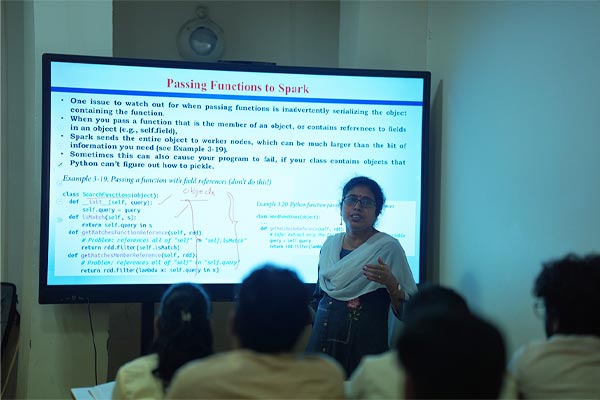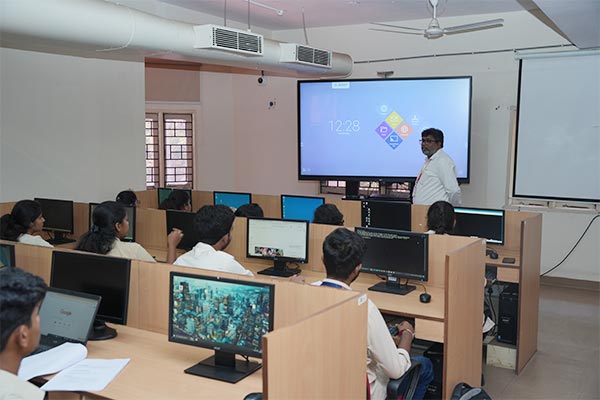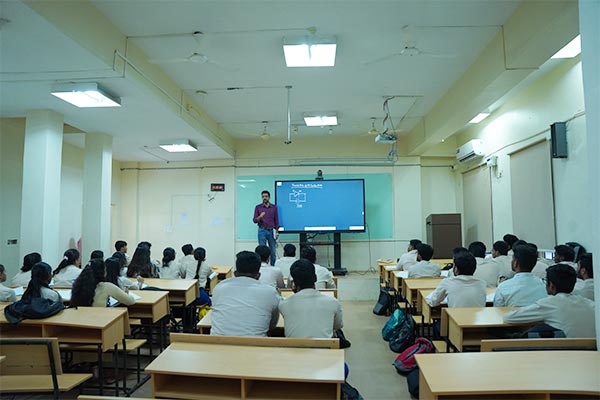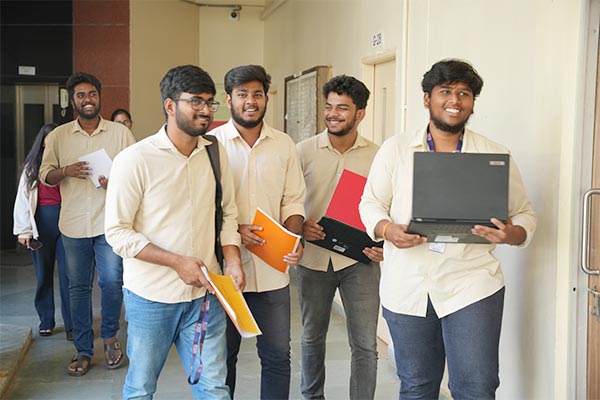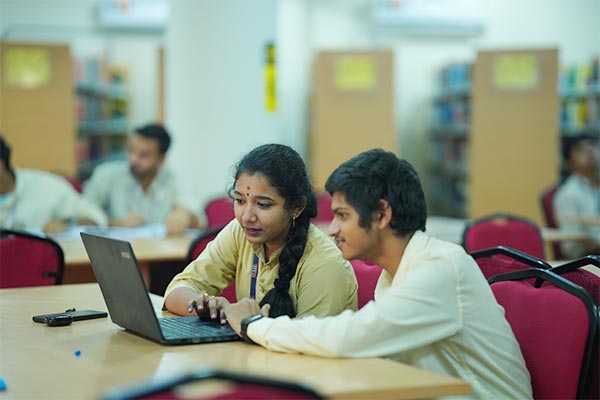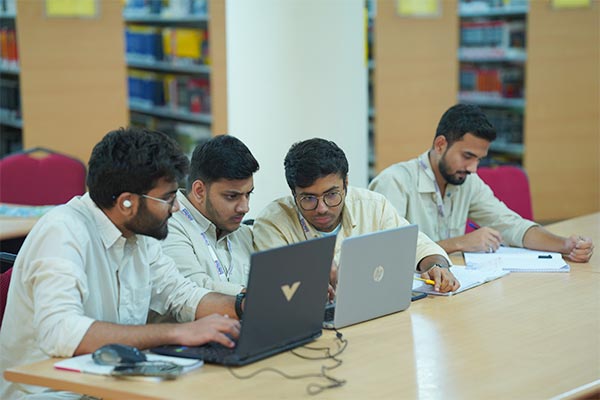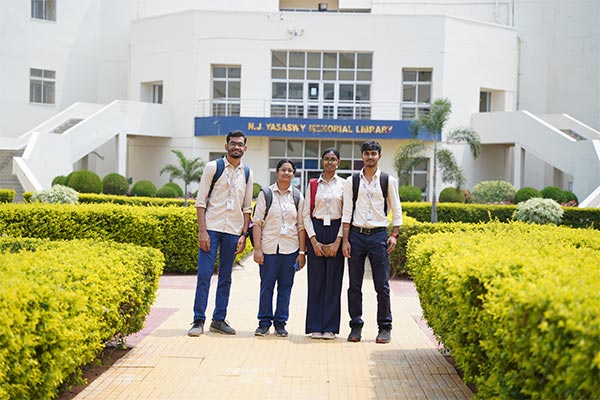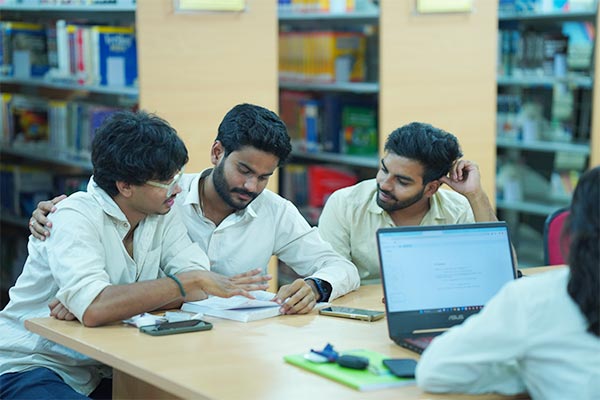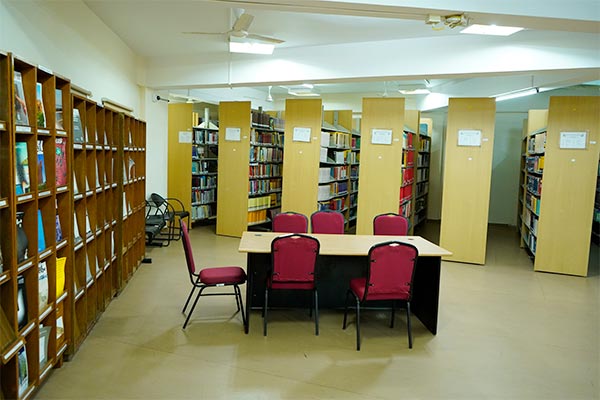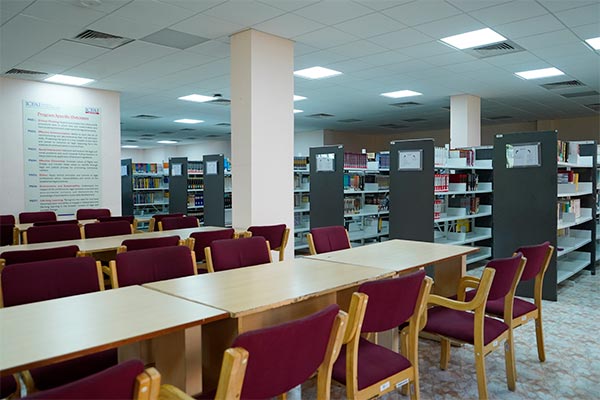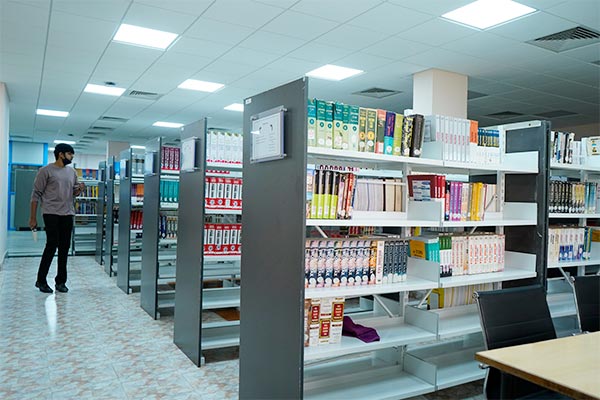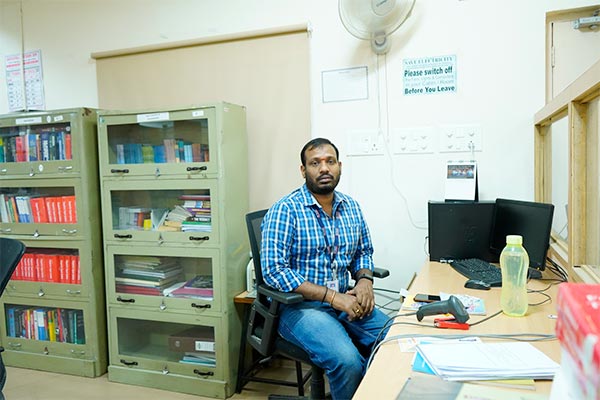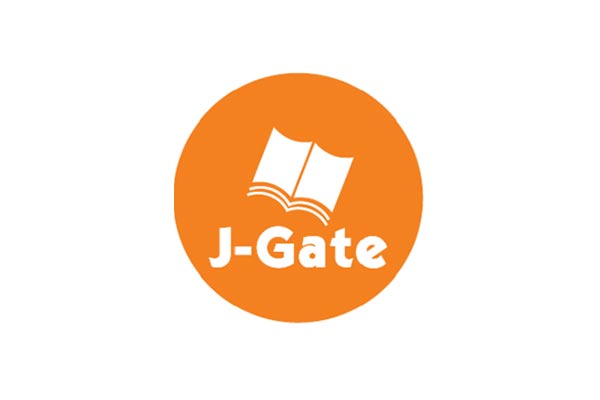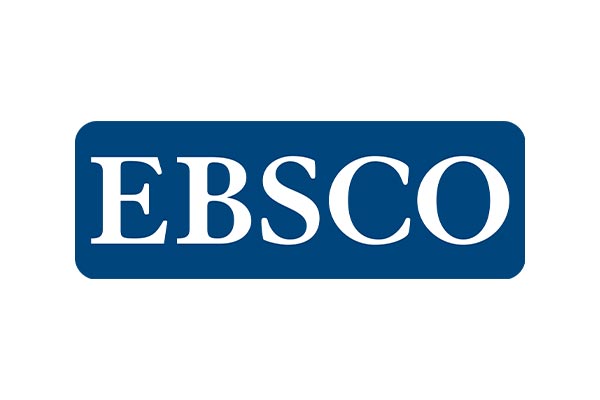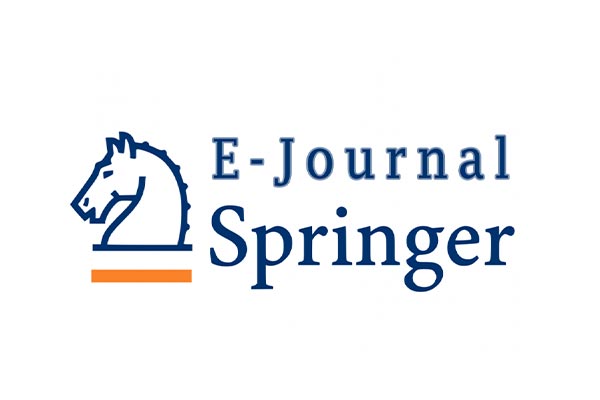Infrastructure
- IFHE boasts a scenic campus with smart board classrooms, Learning Resource Center, library facilities, e-resources, well-equipped Laboratories, Computing Resource Center, hostels, and sports and recreational facilities.
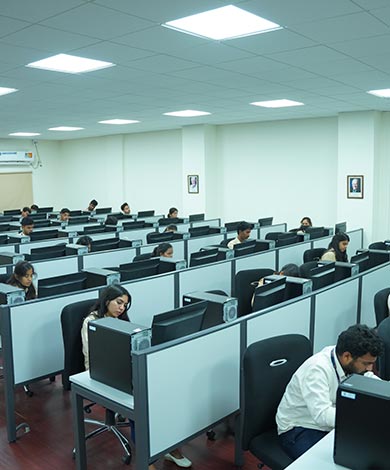
Laboratory Infrastructure
English Language Laboratories
- The English Language Laboratories are in use to facilitate interactive and innovative teaching and learning activities along with computer-based exercises and activities to enhance learners’ English proficiency.
- The language Laboratories use the Blended learning method, using traditional and computer-based instruction and learning.
- The language Laboratories provide access to various learning platforms like the British Council and Cambridge University. The objectives of the language laboratories are a) to facilitate self-learning and b) to facilitate complementary learning by using blended learning techniques.
Science Laboratories
- Science Laboratories are spacious teaching laboratories where each student can perform his /her experiments individually.
Physics Laboratories
- Physics Laboratories is well equipped with all the facilities and equipment required for B.Tech./B.Sc. students to do experiments in the areas of mechanics, optics, electricity and magnetism as part of their Curriculum. The physics laboratories has experimental facilities for experiments like Compound Pendulum, Moment of Inertia of Flywheel, parallelogram law of forces, Dispersive power of the material of a prism, Diffraction Grating, Magnetic Field along the Axis of Current-Carrying Coil by Stewart and Gees Method, Hall effect, Planck’s constant.
Chemistry Laboratories
- Chemistry Laboratories is well equipped with all the facilities and equipment required for B.Tech./B.Sc. students to do experiments in the areas of conventional titrimetry, colorimetry, conductometry and potentiometry.
- Chemistry laboratories has experimental facility for experiments like full-fledged volumetric analysis setup, digital pH meters, Conductivity meters, Colorimeters, Viscometers, UV-visible spectrophotometer, Double distillation unit, Melting point Apparatus, BOD and COD analyzer.
Laboratory of Imagination Visualization and Artificial Intelligence (LIVIA)
The unifying theme of LIVIA is the perception and modelling of dynamic environments (2D and 3D scenes, speech, etc.) using techniques in artificial intelligence. The laboratory’s scientific orientation revolves around the key foundations of “large-scale processing, analysis and interpretation of images and videos.”
From a scientific point of view, LIVIA’s research and development activities are based on six main conceptual axes and their main fields of application
- Machine learning
- Computer vision
- Pattern recognition
- Adaptive and intelligent systems
- Information fusion
- Optimization of complex systems.
Our group’s research interests lie at the intersection of the theory and application of machine learning - with a focus on applications in computer vision. With a strong interest in the mathematical fundamentals and a passion for real-world application, our group aims on being at the forefront of the field, by carrying out impactful research in the areas of deep learning, machine learning and computer vision, guided by application contexts derived from real-world use.
The techniques developed at LIVIA are used to solve concrete and complex problems, for example, in the development of convolutional neural networks to detect tumour’s or the level of depression of a patient, and this in a context where must deal with a massive amount of data that typically has limited annotations. The fields of application which are the subject of our main research initiatives are:
- Analysis of medical, satellite, aerial images, etc.
- Biometrics: recognition of individuals from the signature, the face, the voice, etc.
- Automatic processing of handwritten documents
- Affective computing for health monitoring
- Security and surveillance.
3D Printing and Fabrication Lab
Centre for Advanced NANO Fabrication and Characterisation
Centre for ROBOTICS and Intelligent Manufacturing Systems
Laboratory of Adaptive Resonance Theory
Research Lab
Academic Infrastructure
Civil Engineering laboratories
The State-of-the-Art Laboratories are special features of the department that endow its students with advanced technical knowledge. The Civil Engineering department has the following state-of-the-art laboratories:
- Engineering Graphics
- Surveying
- Mechanics of solids
- Fluid Mechanics
- Hydraulics & Hydraulic Machines
- Geotechnical Engineering
- Transportation Engineering
- Building Materials & Concrete Technology
- Building Drawing using AutoCAD
- Design of Concrete Structures
- Finite Element Analysis using ANSYS
Computer Science and Engineering (CSE) and Artificial Intelligence and Data Science (AIDS) Laboratories
- Computer Science and Engineering (CSE) and Artificial Intelligence and Data Science (AIDS) departments are equipped with state-of-the-art academic and research laboratories.
- The academic laboratories are an important source of imparting a solid foundation on various core courses like computer programming, Data structures, Operating system, Computer Networks, Databases, advanced courses like Cyber Security, Artificial Intelligence, Machine learning, IoT, Cloud computing, and Blockchain technologies.
- The department also ensures to provide facility to carry out Technical Innovation Projects (TIP) and Special Projects so that students become industry- ready employees.
- Some of the laboratories are connected to self-learning facilities like Nptel, Swayam and Digital libraries.
-
The following are some of the highlights of the
department Laboratories:
- All systems are upgraded to i7 processors.
- All systems are connected to Gigabit Ethernet and UPS systems with good power backup.
Electronics and Communication Laboratories
Engineering Laboratories in the Department of Electronics and Communication Engineering are equipped with state of art facilities for the undergraduate, post-graduate, M.Tech & Ph.D courses.
Different laboratories in the department are:
- Digital Electronics Laboratories
- Microprocessor and Interfacing Laboratories
- RF Microwave Laboratories
- Power Electronics Laboratories
- Electrical Machines Laboratories
- Communication System Laboratories
- Digital Signal Processing Laboratories
- Electronic Circuit Analysis Laboratories
- PCB Design Laboratories
Department of Electronics and Communication Engineering Laboratories was established with the vision of developing the department as a center of excellence in R & D, in the field of Electronics and Communication Engineering and make the students blossom into meritorious and self-disciplined engineers through hard work. Electronics and Communication engineering is a swiftly advancing field, with new ideas emerging every other second. The Laboratories are equipped with extensive simulation tools like Spice and MATLAB tools.
Mechanical Engineering Laboratories
The department has laboratories equipped with sophisticated facilities/equipment for various approaches of the interdisciplinary approach in terms of both software and hardware. The students are engraved with the skill sets which make them industry ready and here is the list of a few laboratories:
- 3D Printing Laboratories
- CAD/CAM Laboratories
- Engineering Materials Laboratories
- Engineering Measurements Laboratories
- Fluid Mechanics and Heat Transfer Laboratories
- Hydraulics and Pneumatic Systems Laboratories
- Mechanics of Solids Laboratories
- Basics Mechatronics Laboratories
- Advanced Mechatronics Laboratories
- Machining Processes and Metrology Laboratories
- Thermal Engineering Laboratories
- Workshop Practice Laboratories
The laboratories and experiments are designed in such a way that the creativity and analytical skills of the student are enhanced so that he/she will be able to design and develop new mechatronic systems. The laboratories are equipped with advanced facilities/equipment like CNC trainer lathe, 3D Printer Dreamer, 3D Printer Guider, Sense 3D Scanner P/N 391230, PLC Trainer Kit, Temperature Control Panel, Belt Conveyor Panel, Traffic Light Control Panel, Sensor Module, Sensor Trainer Kit, CNC controlled EDM Machine, Stereo Zoom Microscope (DS2-88), UTM, Compression testing, Profile Projector, Strain, temperature, force and vibration measurement. The laboratories are equipped with advanced software’s like Auto CAD, ProE, Flash forge, Hercus, Ansys and MATLAB-Simulink.
IcfaiTech Infrastructure
Interactive Smartboard/electronic whiteboard classrooms
- The University is equipped with interactive smartboards in place of chalkboards and paper-based lessons do not connect with students in the present world.
- With the computer/laptop connected to the Internet, the faculty can access information around the world in the form of images/videos related to their courses. (The faculties can access global material in the form of photos and videos relevant to their subjects by connecting their laptop or computer to the Internet.)
Laptops
- All the B.Tech. students should purchase laptops.
- The purpose of having laptops is to enable them to be connected anytime to solve laboratories problems, etc.
Learning Resource Center (LRC)
- The University has a central library ‘Sri N J Yasaswy Memorial Library’, named after the founder of ICFAI Group.
- The University also has two more libraries attached to the IcfaiTech (Faculty of Science & Technology) and the Faculty of Law.
- The three libraries are fully computerized with integrated library management software viz., Libsuite.
- The spacious central library is spread over three floors, and has a carpet area of 45,000 sq.ft. and is centrally air conditioned.
- It has a seating capacity of 700. The two libraries at Faculty of Science and Technology and Faculty of Law have a spacious carpet area.
- The library staff is professionally qualified and experienced. They maintain the library efficiently, catering to the needs of the users.
- IcfaiTech has a well-stocked library containing reference materials, magazines, journals, and books of national and international publications.
- IcfaiTech has a digital library consisting of various databases, namely, J-Gate, EBSCO, Springer, IEEE, NPTEL & SWAYAM etc. These databases facilitate the research activities of students and faculty members.
Library Holdings
- The Central Library has a diverse collection of books, CD/DVDs, reports, and national/international periodicals related to all functional areas of management, economics, science & technology, law, architecture, and general books.
- All the library activities are computerized with the help of Libsuite, the integrated library management software. The library documents are classified according to the Dewey decimal classification system.
- An online catalogue is maintained. This helps the students, faculty and staff to trace books easily. All the documents are bar-coded and bar-coded identity cards are issued to the users (students, faculty & staff) for borrowing the documents.
- The library also subscribes to several online databases such as EBSCO, Emerald, Science Direct, and ProQuest, etc. To enable the users to access these databases as well as the library catalogue (WebOPAC) through the campus intranet.
- Photocopying facilities are also available within the library premises. Research related software like IBM SPSS & SAS are made available to the students, scholars and faculty members. Research related books, monographs, and dissertations/theses are housed in the reference section.
- The latest books and revised editions in the related fields are procured every month keeping in view future requirements.
- The library has a holding of 99,665 books and 17,360 e-books. 3,190 CDs/DVDs and 3,788 other holdings. It has subscribed to 52 printed international journals, 126 printed Indian journals, and 2,500 online international journals.
- The library has also subscribed to 21 printed international magazines and 100 printed national magazines.
E-resources
- It has 27 Online Databases (E-resources) that includes J-Gate Engineering; IEEE ASPP+POP; Springer E-Journals; Science Direct; EBSCO Engineering Collection; EBSCO (Business Source Complete); EBSCO (Econlit); Emerald Management Xtra; Marketline; ProQuest; JSTOR; Capitaline Plus; Cabell’s Directories; CMIE (Prowess, Economic Outlook, Capex, Industry Outlook); Prime Database; Scopus; EPWRF Datasets; Taxmann (FOL); Manupatra Online (FOL) and EBSCO E-Books Business Collection.
